fmt::v8::detail Namespace Reference
Namespaces | |
| digits | |
| dragonbox | |
Typedefs | |
| template<typename T > | |
| using | buffer_appender = conditional_t< std::is_same< T, char >::value, appender, std::back_insert_iterator< buffer< T > >> |
| template<typename T , typename Char > | |
| using | has_fallback_formatter = std::is_constructible< fallback_formatter< T, Char > > |
| using | long_type = conditional_t< long_short, int, long long > |
| using | ulong_type = conditional_t< long_short, unsigned, unsigned long long > |
| template<typename T , typename Context > | |
| using | mapped_type_constant = type_constant< decltype(arg_mapper< Context >().map(std::declval< const T & >())), typename Context::char_type > |
| template<typename... > | |
| using | void_t = void |
| using | uintptr_t = fallback_uintptr |
| template<typename T > | |
| using | iterator_t = decltype(std::begin(std::declval< T & >())) |
| template<typename T > | |
| using | sentinel_t = decltype(std::end(std::declval< T & >())) |
| template<typename T > | |
| using | checked_ptr = T * |
| template<typename OutputIt > | |
| using | reserve_iterator = remove_reference_t< decltype(reserve(std::declval< OutputIt & >(), 0))> |
| template<typename T > | |
| using | is_signed = std::integral_constant< bool, std::numeric_limits< T >::is_signed||std::is_same< T, int128_t >::value > |
| template<typename T > | |
| using | uint32_or_64_or_128_t = conditional_t< num_bits< T >()<=32 &&! 0, uint32_t, conditional_t< num_bits< T >()<=64, uint64_t, uint128_t > > |
| template<typename T > | |
| using | uint64_or_128_t = conditional_t< num_bits< T >()<=64, uint64_t, uint128_t > |
| template<typename T > | |
| using | is_integer = bool_constant< is_integral< T >::value &&!std::is_same< T, bool >::value &&!std::is_same< T, char >::value &&!std::is_same< T, wchar_t >::value > |
| using | format_func = void(*)(detail::buffer< char > &, int, const char *) |
| template<size_t... N> | |
| using | index_sequence = integer_sequence< size_t, N... > |
| template<size_t N> | |
| using | make_index_sequence = make_integer_sequence< size_t, N > |
| template<typename Range > | |
| using | value_type = remove_cvref_t< decltype(*detail::range_begin(std::declval< Range >()))> |
| template<typename T > | |
| using | is_exotic_char = bool_constant<!std::is_same< T, char >::value > |
Functions | |
| template<typename T > | |
| const T & | unwrap (const T &v) |
| template<typename T > | |
| const T & | unwrap (const std::reference_wrapper< T > &v) |
| null | localtime_r (...) |
| null | localtime_s (...) |
| null | gmtime_r (...) |
| null | gmtime_s (...) |
| const std::locale & | get_classic_locale () |
| template<typename CodeUnit > | |
| void | write_codecvt (codecvt_result< CodeUnit > &out, string_view in_buf, const std::locale &loc) |
| template<typename OutputIt > | |
| auto | write_encoded_tm_str (OutputIt out, string_view in, const std::locale &loc) -> OutputIt |
| template<typename Char , typename OutputIt , enable_if_t<(!std::is_same< Char, char >::value), int > = 0> | |
| auto | write_tm_str (OutputIt out, string_view sv, const std::locale &loc) -> OutputIt |
| template<typename Char > | |
| void | do_write (buffer< Char > &buf, const std::tm &time, const std::locale &loc, char format, char modifier) |
| template<typename Char , typename OutputIt , enable_if_t<(!std::is_same< Char, char >::value), int > = 0> | |
| auto | write (OutputIt out, const std::tm &time, const std::locale &loc, char format, char modifier=0) -> OutputIt |
| void | write_digit2_separated (char *buf, unsigned a, unsigned b, unsigned c, char sep) |
| template<typename Period > | |
| const char * | get_units () |
| template<typename Char , typename Handler > | |
| const Char * | parse_chrono_format (const Char *begin, const Char *end, Handler &&handler) |
| const char * | tm_wday_full_name (int wday) |
| const char * | tm_wday_short_name (int wday) |
| const char * | tm_mon_full_name (int mon) |
| const char * | tm_mon_short_name (int mon) |
| template<typename T , enable_if_t<(std::is_integral< T >::value), int > = 0> | |
| bool | isnan (T) |
| template<typename T , enable_if_t<(std::is_integral< T >::value), int > = 0> | |
| bool | isfinite (T) |
| template<typename T , typename Int , enable_if_t<(std::is_integral< T >::value), int > = 0> | |
| Int | to_nonnegative_int (T value, Int upper) |
| template<typename T , enable_if_t<(std::is_integral< T >::value), int > = 0> | |
| T | mod (T x, int y) |
| template<typename To , typename FromRep , typename FromPeriod > | |
| To | fmt_safe_duration_cast (std::chrono::duration< FromRep, FromPeriod > from) |
| template<typename Rep , typename Period , enable_if_t<(std::is_integral< Rep >::value), int > = 0> | |
| std::chrono::duration< Rep, std::milli > | get_milliseconds (std::chrono::duration< Rep, Period > d) |
| constexpr int | count_fractional_digits (long long num, long long den, int n=0) |
| constexpr long long | pow10 (std::uint32_t n) |
| template<class Rep , class Period , enable_if_t<(std::numeric_limits< Rep >::is_signed), int > = 0> | |
| constexpr std::chrono::duration< Rep, Period > | abs (std::chrono::duration< Rep, Period > d) |
| template<typename Char , typename Rep , typename OutputIt , enable_if_t<(std::is_integral< Rep >::value), int > = 0> | |
| OutputIt | format_duration_value (OutputIt out, Rep val, int) |
| template<typename Char , typename OutputIt > | |
| OutputIt | copy_unit (string_view unit, OutputIt out, Char) |
| template<typename OutputIt > | |
| OutputIt | copy_unit (string_view unit, OutputIt out, wchar_t) |
| template<typename Char , typename Period , typename OutputIt > | |
| OutputIt | format_duration_unit (OutputIt out) |
| template<typename Char > | |
| ansi_color_escape< Char > | make_foreground_color (detail::color_type foreground) throw () |
| template<typename Char > | |
| ansi_color_escape< Char > | make_background_color (detail::color_type background) throw () |
| template<typename Char > | |
| ansi_color_escape< Char > | make_emphasis (emphasis em) throw () |
| template<typename Char > | |
| void | fputs (const Char *chars, FILE *stream) throw () |
| template<> | |
| void | fputs< wchar_t > (const wchar_t *chars, FILE *stream) throw () |
| template<typename Char > | |
| void | reset_color (FILE *stream) throw () |
| template<> | |
| void | reset_color< wchar_t > (FILE *stream) throw () |
| template<typename Char > | |
| void | reset_color (buffer< Char > &buffer) throw () |
| template<typename Char > | |
| void | vformat_to (buffer< Char > &buf, const text_style &ts, basic_string_view< Char > format_str, basic_format_args< buffer_context< type_identity_t< Char >>> args) |
| template<typename Char , typename InputIt > | |
| counting_iterator | copy_str (InputIt begin, InputIt end, counting_iterator it) |
| template<typename T , typename... Tail> | |
| const T & | first (const T &value, const Tail &...) |
| template<typename... T> | |
| void | ignore_unused (const T &...) |
| constexpr auto | is_constant_evaluated (bool default_value=false) -> bool throw () |
| template<typename T > | |
| constexpr auto | const_check (T value) -> T |
| void | assert_fail (const char *file, int line, const char *message) |
| template<typename T > | |
| auto | convert_for_visit (T) -> monostate |
| template<typename Int > | |
| auto | to_unsigned (Int value) -> typename std::make_unsigned< Int >::type |
| constexpr auto | is_utf8 () -> bool |
| void | to_string_view (...) |
| template<typename... , typename S , enable_if_t<(!is_compile_string< S >::value), int > = 0> | |
| void | check_format_string (const S &) |
| template<typename... , typename S , enable_if_t<(is_compile_string< S >::value), int > = 0> | |
| void | check_format_string (S) |
| void | throw_format_error (const char *message) |
| template<typename Context , typename T > | |
| constexpr auto | has_const_formatter_impl (T *) -> decltype(typename Context::template formatter_type< T >().format(std::declval< const T & >(), std::declval< Context & >()), true) |
| template<typename Context > | |
| constexpr auto | has_const_formatter_impl (...) -> bool |
| template<typename T , typename Context > | |
| constexpr auto | has_const_formatter () -> bool |
| template<typename Container > | |
| auto | get_container (std::back_insert_iterator< Container > it) -> Container & |
| template<typename Char , typename InputIt , typename OutputIt > | |
| auto | copy_str (InputIt begin, InputIt end, OutputIt out) -> OutputIt |
| template<typename Char , typename T , typename U , enable_if_t<(std::is_same< remove_const_t< T >, U >::value &&is_char< U >::value), int > = 0> | |
| auto | copy_str (T *begin, T *end, U *out) -> U * |
| template<typename T , typename OutputIt > | |
| auto | get_buffer (OutputIt out) -> iterator_buffer< OutputIt, T > |
| template<typename Buffer > | |
| auto | get_iterator (Buffer &buf) -> decltype(buf.out()) |
| template<typename T > | |
| auto | get_iterator (buffer< T > &buf) -> buffer_appender< T > |
| template<typename Char > | |
| void | init_named_args (named_arg_info< Char > *, int, int) |
| template<typename Char , typename T , typename... Tail, enable_if_t<(!is_named_arg< T >::value), int > = 0> | |
| void | init_named_args (named_arg_info< Char > *named_args, int arg_count, int named_arg_count, const T &, const Tail &... args) |
| template<typename... Args> | |
| void | init_named_args (std::nullptr_t, int, int, const Args &...) |
| template<bool B = false> | |
| constexpr auto | count () -> size_t |
| template<bool B1, bool B2, bool... Tail> | |
| constexpr auto | count () -> size_t |
| template<typename... Args> | |
| constexpr auto | count_named_args () -> size_t |
| template<typename... Args> | |
| constexpr auto | count_statically_named_args () -> size_t |
| constexpr bool | is_integral_type (type t) |
| constexpr bool | is_arithmetic_type (type t) |
| template<typename Context , typename T > | |
| auto | make_arg (const T &value) -> basic_format_arg< Context > |
| template<typename Char , typename InputIt > | |
| auto | copy_str (InputIt begin, InputIt end, appender out) -> appender |
| template<typename > | |
| constexpr auto | encode_types () -> unsigned long long |
| template<typename Context , typename Arg , typename... Args> | |
| constexpr auto | encode_types () -> unsigned long long |
| template<bool IS_PACKED, typename Context , type , typename T , enable_if_t<(IS_PACKED), int > = 0> | |
| auto | make_arg (T &&val) -> value< Context > |
| template<bool IS_PACKED, typename Context , type , typename T , enable_if_t<(!IS_PACKED), int > = 0> | |
| auto | make_arg (const T &value) -> basic_format_arg< Context > |
| template<typename Char > | |
| constexpr bool | is_ascii_letter (Char c) |
| template<typename Char , enable_if_t<(std::is_integral< Char >::value), int > = 0> | |
| constexpr auto | to_ascii (Char value) -> Char |
| template<typename Char > | |
| auto | code_point_length (const Char *begin) -> int |
| template<bool IS_CONSTEXPR, typename T , typename Ptr = const T*> | |
| auto | find (Ptr first, Ptr last, T value, Ptr &out) -> bool |
| template<> | |
| auto | find< false, char > (const char *first, const char *last, char value, const char *&out) -> bool |
| template<typename Char > | |
| auto | parse_nonnegative_int (const Char *&begin, const Char *end, int error_value) noexcept -> int |
| template<typename Char , typename Handler > | |
| auto | parse_align (const Char *begin, const Char *end, Handler &&handler) -> const Char * |
| template<typename Char > | |
| bool | is_name_start (Char c) |
| template<typename Char , typename IDHandler > | |
| auto | do_parse_arg_id (const Char *begin, const Char *end, IDHandler &&handler) -> const Char * |
| template<typename Char , typename IDHandler > | |
| auto | parse_arg_id (const Char *begin, const Char *end, IDHandler &&handler) -> const Char * |
| template<typename Char , typename Handler > | |
| auto | parse_width (const Char *begin, const Char *end, Handler &&handler) -> const Char * |
| template<typename Char , typename Handler > | |
| auto | parse_precision (const Char *begin, const Char *end, Handler &&handler) -> const Char * |
| template<typename Char > | |
| auto | parse_presentation_type (Char type) -> presentation_type |
| template<typename Char , typename SpecHandler > | |
| auto | parse_format_specs (const Char *begin, const Char *end, SpecHandler &&handler) -> const Char * |
| template<typename Char , typename Handler > | |
| auto | parse_replacement_field (const Char *begin, const Char *end, Handler &&handler) -> const Char * |
| template<bool IS_CONSTEXPR, typename Char , typename Handler > | |
| void | parse_format_string (basic_string_view< Char > format_str, Handler &&handler) |
| template<typename T , typename ParseContext > | |
| auto | parse_format_specs (ParseContext &ctx) -> decltype(ctx.begin()) |
| template<typename ErrorHandler > | |
| void | check_int_type_spec (presentation_type type, ErrorHandler &&eh) |
| template<typename Char , typename ErrorHandler = error_handler> | |
| auto | check_char_specs (const basic_format_specs< Char > &specs, ErrorHandler &&eh={}) -> bool |
| template<typename ErrorHandler = error_handler, typename Char > | |
| auto | parse_float_type_spec (const basic_format_specs< Char > &specs, ErrorHandler &&eh={}) -> float_specs |
| template<typename ErrorHandler = error_handler> | |
| auto | check_cstring_type_spec (presentation_type type, ErrorHandler &&eh={}) -> bool |
| template<typename ErrorHandler = error_handler> | |
| void | check_string_type_spec (presentation_type type, ErrorHandler &&eh={}) |
| template<typename ErrorHandler > | |
| void | check_pointer_type_spec (presentation_type type, ErrorHandler &&eh) |
| template<typename... Args, typename Char > | |
| auto | get_arg_index_by_name (basic_string_view< Char > name) -> int |
| template<typename Char > | |
| void | vformat_to (buffer< Char > &buf, basic_string_view< Char > fmt, basic_format_args< basic_format_context< detail::buffer_appender< type_identity_t< Char > >, type_identity_t< Char > >> args, locale_ref loc={}) |
| void | vprint_mojibake (std::FILE *, string_view, format_args) |
| void | format_error_code (detail::buffer< char > &out, int error_code, string_view message) throw () |
| void | report_error (format_func func, int error_code, const char *message) throw () |
| void | fwrite_fully (const void *ptr, size_t size, size_t count, FILE *stream) |
| template<typename Char > | |
| auto | thousands_sep_impl (locale_ref loc) -> thousands_sep_result< Char > |
| template<typename Char > | |
| Char | decimal_point_impl (locale_ref loc) |
| template<> | |
| int | count_digits< 4 > (detail::fallback_uintptr n) |
| template<typename Float > | |
| constexpr int | num_significand_bits () |
| template<int SHIFT = 0> | |
| fp | normalize (fp value) |
| bool | operator== (fp x, fp y) |
| uint64_t | multiply (uint64_t lhs, uint64_t rhs) |
| fp | operator* (fp x, fp y) |
| fp | get_cached_power (int min_exponent, int &pow10_exponent) |
| round_direction | get_round_direction (uint64_t divisor, uint64_t remainder, uint64_t error) |
| digits::result | grisu_gen_digits (fp value, uint64_t error, int &exp, gen_digits_handler &handler) |
| void | format_dragon (fp value, bool is_predecessor_closer, int num_digits, buffer< char > &buf, int &exp10) |
| template<typename Float > | |
| int | format_float (Float value, int precision, float_specs specs, buffer< char > &buf) |
| template<typename T > | |
| int | snprintf_float (T value, int precision, float_specs specs, buffer< char > &buf) |
| void | print (std::FILE *f, string_view text) |
| template<typename To , typename From > | |
| auto | bit_cast (const From &from) -> To |
| auto | is_big_endian () -> bool |
| auto | to_uintptr (const void *p) -> fallback_uintptr |
| template<typename T > | |
| constexpr auto | max_value () -> T |
| template<typename T > | |
| constexpr auto | num_bits () -> int |
| template<> | |
| constexpr auto | num_bits< int128_t > () -> int |
| template<> | |
| constexpr auto | num_bits< uint128_t > () -> int |
| template<> | |
| constexpr auto | num_bits< fallback_uintptr > () -> int |
| void | assume (bool condition) |
| template<typename Char > | |
| auto | get_data (std::basic_string< Char > &s) -> Char * |
| template<typename Container > | |
| auto | get_data (Container &c) -> typename Container::value_type * |
| template<typename T > | |
| constexpr auto | make_checked (T *p, size_t) -> T * |
| template<typename Container , enable_if_t<(is_contiguous< Container >::value), int > = 0> | |
| auto | reserve (std::back_insert_iterator< Container > it, size_t n) -> checked_ptr< typename Container::value_type > |
| template<typename T > | |
| auto | reserve (buffer_appender< T > it, size_t n) -> buffer_appender< T > |
| template<typename Iterator > | |
| constexpr auto | reserve (Iterator &it, size_t) -> Iterator & |
| template<typename T , typename OutputIt > | |
| constexpr auto | to_pointer (OutputIt, size_t) -> T * |
| template<typename T > | |
| auto | to_pointer (buffer_appender< T > it, size_t n) -> T * |
| template<typename Container , enable_if_t<(is_contiguous< Container >::value), int > = 0> | |
| auto | base_iterator (std::back_insert_iterator< Container > &it, checked_ptr< typename Container::value_type >) -> std::back_insert_iterator< Container > |
| template<typename Iterator > | |
| constexpr auto | base_iterator (Iterator, Iterator it) -> Iterator |
| template<typename OutputIt , typename Size , typename T > | |
| auto | fill_n (OutputIt out, Size count, const T &value) -> OutputIt |
| template<typename T , typename Size > | |
| auto | fill_n (T *out, Size count, char value) -> T * |
| template<typename OutChar , typename InputIt , typename OutputIt > | |
| auto | copy_str_noinline (InputIt begin, InputIt end, OutputIt out) -> OutputIt |
| auto | utf8_decode (const char *s, uint32_t *c, int *e) -> const char * |
| template<typename F > | |
| void | for_each_codepoint (string_view s, F f) |
| template<typename Char > | |
| auto | compute_width (basic_string_view< Char > s) -> size_t |
| size_t | compute_width (string_view s) |
| auto | compute_width (basic_string_view< char8_type > s) -> size_t |
| template<typename Char > | |
| auto | code_point_index (basic_string_view< Char > s, size_t n) -> size_t |
| auto | code_point_index (basic_string_view< char8_type > s, size_t n) -> size_t |
| template<typename T , enable_if_t<(is_signed< T >::value), int > = 0> | |
| auto | is_negative (T value) -> bool |
| template<typename T , enable_if_t<(std::is_floating_point< T >::value), int > = 0> | |
| auto | is_supported_floating_point (T) -> uint16_t |
| constexpr const char * | digits2 (size_t value) |
| template<typename Char , typename Sign > | |
| constexpr Char | sign (Sign s) |
| template<typename T > | |
| auto | count_digits_fallback (T n) -> int |
| auto | count_digits (uint64_t n) -> int |
| template<int BITS, typename UInt > | |
| auto | count_digits (UInt n) -> int |
| auto | count_digits (uint32_t n) -> int |
| template<typename Int > | |
| constexpr auto | digits10 () -> int throw () |
| template<> | |
| constexpr auto | digits10< int128_t > () -> int throw () |
| template<> | |
| constexpr auto | digits10< uint128_t > () -> int throw () |
| template<typename Char > | |
| auto | thousands_sep (locale_ref loc) -> thousands_sep_result< Char > |
| template<> | |
| auto | thousands_sep (locale_ref loc) -> thousands_sep_result< wchar_t > |
| template<typename Char > | |
| auto | decimal_point_impl (locale_ref loc) -> Char |
| template<typename Char > | |
| auto | decimal_point (locale_ref loc) -> Char |
| template<> | |
| auto | decimal_point (locale_ref loc) -> wchar_t |
| template<typename Char > | |
| auto | equal2 (const Char *lhs, const char *rhs) -> bool |
| auto | equal2 (const char *lhs, const char *rhs) -> bool |
| template<typename Char > | |
| void | copy2 (Char *dst, const char *src) |
| template<typename Char , typename UInt > | |
| auto | format_decimal (Char *out, UInt value, int size) -> format_decimal_result< Char * > |
| template<typename Char , typename UInt , typename Iterator , enable_if_t<(!std::is_pointer< remove_cvref_t< Iterator >>::value), int > = 0> | |
| auto | format_decimal (Iterator out, UInt value, int size) -> format_decimal_result< Iterator > |
| template<unsigned BASE_BITS, typename Char , typename UInt > | |
| auto | format_uint (Char *buffer, UInt value, int num_digits, bool upper=false) -> Char * |
| template<unsigned BASE_BITS, typename Char > | |
| auto | format_uint (Char *buffer, detail::fallback_uintptr n, int num_digits, bool=false) -> Char * |
| template<unsigned BASE_BITS, typename Char , typename It , typename UInt > | |
| auto | format_uint (It out, UInt value, int num_digits, bool upper=false) -> It |
| template<typename T > | |
| constexpr auto | exponent_mask () -> typename dragonbox::float_info< T >::carrier_uint |
| template<typename Char , typename It > | |
| auto | write_exponent (int exp, It it) -> It |
| template<typename T > | |
| auto | format_float (T value, int precision, float_specs specs, buffer< char > &buf) -> int |
| template<typename T > | |
| auto | snprintf_float (T value, int precision, float_specs specs, buffer< char > &buf) -> int |
| template<typename T > | |
| constexpr auto | promote_float (T value) -> T |
| constexpr auto | promote_float (float value) -> double |
| template<typename OutputIt , typename Char > | |
| auto | fill (OutputIt it, size_t n, const fill_t< Char > &fill) -> OutputIt |
| template<align::type align = align::left, typename OutputIt , typename Char , typename F > | |
| auto | write_padded (OutputIt out, const basic_format_specs< Char > &specs, size_t size, size_t width, F &&f) -> OutputIt |
| template<align::type align = align::left, typename OutputIt , typename Char , typename F > | |
| constexpr auto | write_padded (OutputIt out, const basic_format_specs< Char > &specs, size_t size, F &&f) -> OutputIt |
| template<align::type align = align::left, typename Char , typename OutputIt > | |
| auto | write_bytes (OutputIt out, string_view bytes, const basic_format_specs< Char > &specs) -> OutputIt |
| template<typename Char , typename OutputIt , typename UIntPtr > | |
| auto | write_ptr (OutputIt out, UIntPtr value, const basic_format_specs< Char > *specs) -> OutputIt |
| template<typename Char , typename OutputIt > | |
| auto | write_char (OutputIt out, Char value, const basic_format_specs< Char > &specs) -> OutputIt |
| template<typename Char , typename OutputIt > | |
| auto | write (OutputIt out, Char value, const basic_format_specs< Char > &specs, locale_ref loc={}) -> OutputIt |
| template<typename OutputIt , typename Char , typename W > | |
| auto | write_int (OutputIt out, int num_digits, unsigned prefix, const basic_format_specs< Char > &specs, W write_digits) -> OutputIt |
| template<typename OutputIt , typename UInt , typename Char > | |
| auto | write_int_localized (OutputIt out, UInt value, unsigned prefix, const basic_format_specs< Char > &specs, const digit_grouping< Char > &grouping) -> OutputIt |
| template<typename OutputIt , typename UInt , typename Char > | |
| auto | write_int_localized (OutputIt &out, UInt value, unsigned prefix, const basic_format_specs< Char > &specs, locale_ref loc) -> bool |
| void | prefix_append (unsigned &prefix, unsigned value) |
| template<typename T > | |
| auto | make_write_int_arg (T value, sign_t sign) -> write_int_arg< uint32_or_64_or_128_t< T >> |
| template<typename Char , typename OutputIt , typename T > | |
| auto | write_int (OutputIt out, write_int_arg< T > arg, const basic_format_specs< Char > &specs, locale_ref loc) -> OutputIt |
| template<typename Char , typename OutputIt , typename T > | |
| auto | write_int_noinline (OutputIt out, write_int_arg< T > arg, const basic_format_specs< Char > &specs, locale_ref loc) -> OutputIt |
| template<typename Char , typename OutputIt , typename T , enable_if_t<(is_integral< T >::value &&!std::is_same< T, bool >::value &&std::is_same< OutputIt, buffer_appender< Char >>::value), int > = 0> | |
| auto | write (OutputIt out, T value, const basic_format_specs< Char > &specs, locale_ref loc) -> OutputIt |
| template<typename Char , typename OutputIt > | |
| auto | write (OutputIt out, basic_string_view< Char > s, const basic_format_specs< Char > &specs) -> OutputIt |
| template<typename Char , typename OutputIt > | |
| auto | write (OutputIt out, basic_string_view< type_identity_t< Char >> s, const basic_format_specs< Char > &specs, locale_ref) -> OutputIt |
| template<typename Char , typename OutputIt > | |
| auto | write (OutputIt out, const Char *s, const basic_format_specs< Char > &specs, locale_ref) -> OutputIt |
| template<typename Char , typename OutputIt > | |
| auto | write_nonfinite (OutputIt out, bool isinf, basic_format_specs< Char > specs, const float_specs &fspecs) -> OutputIt |
| constexpr auto | get_significand_size (const big_decimal_fp &fp) -> int |
| template<typename T > | |
| auto | get_significand_size (const dragonbox::decimal_fp< T > &fp) -> int |
| template<typename Char , typename OutputIt > | |
| constexpr auto | write_significand (OutputIt out, const char *significand, int significand_size) -> OutputIt |
| template<typename Char , typename OutputIt , typename UInt > | |
| auto | write_significand (OutputIt out, UInt significand, int significand_size) -> OutputIt |
| template<typename Char , typename OutputIt , typename T , typename Grouping > | |
| auto | write_significand (OutputIt out, T significand, int significand_size, int exponent, const Grouping &grouping) -> OutputIt |
| template<typename Char , typename UInt , enable_if_t<(std::is_integral< UInt >::value), int > = 0> | |
| auto | write_significand (Char *out, UInt significand, int significand_size, int integral_size, Char decimal_point) -> Char * |
| template<typename OutputIt , typename UInt , typename Char , enable_if_t<(!std::is_pointer< remove_cvref_t< OutputIt >>::value), int > = 0> | |
| auto | write_significand (OutputIt out, UInt significand, int significand_size, int integral_size, Char decimal_point) -> OutputIt |
| template<typename OutputIt , typename Char > | |
| auto | write_significand (OutputIt out, const char *significand, int significand_size, int integral_size, Char decimal_point) -> OutputIt |
| template<typename OutputIt , typename Char , typename T , typename Grouping > | |
| auto | write_significand (OutputIt out, T significand, int significand_size, int integral_size, Char decimal_point, const Grouping &grouping) -> OutputIt |
| template<typename OutputIt , typename DecimalFP , typename Char , typename Grouping = digit_grouping<Char>> | |
| auto | do_write_float (OutputIt out, const DecimalFP &fp, const basic_format_specs< Char > &specs, float_specs fspecs, locale_ref loc) -> OutputIt |
| template<typename OutputIt , typename DecimalFP , typename Char > | |
| auto | write_float (OutputIt out, const DecimalFP &fp, const basic_format_specs< Char > &specs, float_specs fspecs, locale_ref loc) -> OutputIt |
| template<typename T , enable_if_t<(std::is_floating_point< T >::value), int > = 0> | |
| bool | isinf (T value) |
| template<typename T , enable_if_t<(std::is_floating_point< T >::value), int > = 0> | |
| bool | signbit (T value) |
| template<typename Char , typename OutputIt , typename T , enable_if_t<(std::is_floating_point< T >::value), int > = 0> | |
| auto | write (OutputIt out, T value, basic_format_specs< Char > specs, locale_ref loc={}) -> OutputIt |
| template<typename Char , typename OutputIt , typename T , enable_if_t<(is_fast_float< T >::value), int > = 0> | |
| auto | write (OutputIt out, T value) -> OutputIt |
| template<typename Char , typename OutputIt > | |
| auto | write (OutputIt out, monostate, basic_format_specs< Char >={}, locale_ref={}) -> OutputIt |
| template<typename Char , typename OutputIt > | |
| auto | write (OutputIt out, basic_string_view< Char > value) -> OutputIt |
| template<typename Char , typename OutputIt , typename T , enable_if_t<(is_string< T >::value), int > = 0> | |
| constexpr auto | write (OutputIt out, const T &value) -> OutputIt |
| template<typename Char , typename OutputIt , typename T , bool check = std::is_enum<T>::value && !std::is_same<T, Char>::value && mapped_type_constant<T, basic_format_context<OutputIt, Char>>::value != type::custom_type, enable_if_t<(check), int > = 0> | |
| auto | write (OutputIt out, T value) -> OutputIt |
| template<typename Char , typename OutputIt > | |
| auto | write (OutputIt out, Char value) -> OutputIt |
| template<typename Char , typename OutputIt > | |
| auto | write (OutputIt out, const Char *value) -> OutputIt |
| template<typename Char , typename OutputIt , typename T , enable_if_t<(std::is_same< T, void >::value), int > = 0> | |
| auto | write (OutputIt out, const T *value, const basic_format_specs< Char > &specs={}, locale_ref={}) -> OutputIt |
| template<typename Char , typename OutputIt , typename T , typename Context = basic_format_context<OutputIt, Char>> | |
| auto | write (OutputIt out, const T &value) -> enable_if_t< std::is_class< T >::value &&!is_string< T >::value &&!std::is_same< T, Char >::value &&!std::is_same< const T &, decltype(arg_mapper< Context >().map(value))>::value, OutputIt > |
| template<template< typename > class Handler, typename FormatArg , typename ErrorHandler > | |
| auto | get_dynamic_spec (FormatArg arg, ErrorHandler eh) -> int |
| template<typename Context , typename ID > | |
| auto | get_arg (Context &ctx, ID id) -> typename Context::format_arg |
| template<template< typename > class Handler, typename Context > | |
| void | handle_dynamic_spec (int &value, arg_ref< typename Context::char_type > ref, Context &ctx) |
| template<typename Locale , typename Char > | |
| auto | vformat (const Locale &loc, basic_string_view< Char > format_str, basic_format_args< buffer_context< type_identity_t< Char >>> args) -> std::basic_string< Char > |
| template auto | thousands_sep_impl< char > (locale_ref) -> thousands_sep_result< char > |
| template auto | thousands_sep_impl< wchar_t > (locale_ref) -> thousands_sep_result< wchar_t > |
| template auto | format_float< double > (double value, int precision, float_specs specs, buffer< char > &buf) -> int |
| template auto | format_float< long double > (long double value, int precision, float_specs specs, buffer< char > &buf) -> int |
| void | snprintf_float (float, int, float_specs, buffer< char > &)=delete |
| template auto | snprintf_float< double > (double value, int precision, float_specs specs, buffer< char > &buf) -> int |
| template auto | snprintf_float< long double > (long double value, int precision, float_specs specs, buffer< char > &buf) -> int |
| template<typename Char > | |
| void | write_buffer (std::basic_ostream< Char > &os, buffer< Char > &buf) |
| template<typename Char , typename T > | |
| void | format_value (buffer< Char > &buf, const T &value, locale_ref loc=locale_ref()) |
| template<typename T , typename Context , typename Char > | |
| void | convert_arg (basic_format_arg< Context > &arg, Char type) |
| template<typename Char > | |
| void | parse_flags (basic_format_specs< Char > &specs, const Char *&it, const Char *end) |
| template<typename Char , typename GetArg > | |
| int | parse_header (const Char *&it, const Char *end, basic_format_specs< Char > &specs, GetArg get_arg) |
| template<typename Char , typename Context > | |
| void | vprintf (buffer< Char > &buf, basic_string_view< Char > format, basic_format_args< Context > args) |
| template<typename RangeT , typename OutputIterator > | |
| OutputIterator | copy (const RangeT &range, OutputIterator out) |
| template<typename OutputIterator > | |
| OutputIterator | copy (const char *str, OutputIterator out) |
| template<typename OutputIterator > | |
| OutputIterator | copy (char ch, OutputIterator out) |
| template<typename OutputIterator > | |
| OutputIterator | copy (wchar_t ch, OutputIterator out) |
| template<typename T , std::size_t N> | |
| auto | range_begin (const T(&arr)[N]) -> const T * |
| template<typename T , std::size_t N> | |
| auto | range_end (const T(&arr)[N]) -> const T * |
| template<typename T > | |
| auto | range_begin (T &&rng) -> decltype(static_cast< T && >(rng).begin()) |
| template<typename T > | |
| auto | range_end (T &&rng) -> decltype(static_cast< T && >(rng).end()) |
| template<class Tuple , class F , size_t... Is> | |
| void | for_each (index_sequence< Is... >, Tuple &&tup, F &&f) throw () |
| template<class T > | |
| make_index_sequence< std::tuple_size< T >::value > | get_indexes (T const &) |
| template<class Tuple , class F > | |
| void | for_each (Tuple &&tup, F &&f) |
| template<typename OutputIt > | |
| OutputIt | write_delimiter (OutputIt out) |
| auto | is_printable (uint16_t x, const singleton *singletons, size_t singletons_size, const unsigned char *singleton_lowers, const unsigned char *normal, size_t normal_size) -> bool |
| auto | is_printable (uint32_t cp) -> bool |
| auto | needs_escape (uint32_t cp) -> bool |
| template<typename Char > | |
| auto | find_escape (const Char *begin, const Char *end) -> find_escape_result< Char > |
| auto | find_escape (const char *begin, const char *end) -> find_escape_result< char > |
| template<typename Char , typename OutputIt > | |
| auto | write_range_entry (OutputIt out, basic_string_view< Char > str) -> OutputIt |
| template<typename Char , typename OutputIt , typename T , enable_if_t<(std::is_convertible< T, std_string_view< char >>::value), int > = 0> | |
| auto | write_range_entry (OutputIt out, const T &str) -> OutputIt |
| template<typename Char , typename OutputIt , typename Arg , enable_if_t<(std::is_same< Arg, Char >::value), int > = 0> | |
| OutputIt | write_range_entry (OutputIt out, const Arg v) |
| template<typename Char , typename OutputIt , typename Arg , enable_if_t<(!is_std_string_like< typename std::decay< Arg >::type >::value &&!std::is_same< Arg, Char >::value), int > = 0> | |
| OutputIt | write_range_entry (OutputIt out, const Arg &v) |
Variables | |
| constexpr unsigned char | micro [] = "\u00B5" |
| constexpr int | invalid_arg_index = -1 |
| static constexpr uint64_t | log10_2_significand = 0x4d104d427de7fbcc |
| constexpr uint32_t | invalid_code_point = ~uint32_t() |
Typedef Documentation
◆ buffer_appender
template<typename T >
| using fmt::v8::detail::buffer_appender = typedef conditional_t<std::is_same<T, char>::value, appender, std::back_insert_iterator<buffer<T> >> |
◆ checked_ptr
template<typename T >
| using fmt::v8::detail::checked_ptr = typedef T* |
◆ format_func
| using fmt::v8::detail::format_func = typedef void (*)(detail::buffer<char>&, int, const char*) |
◆ has_fallback_formatter
template<typename T , typename Char >
| using fmt::v8::detail::has_fallback_formatter = typedef std::is_constructible<fallback_formatter<T, Char> > |
◆ index_sequence
template<size_t... N>
| using fmt::v8::detail::index_sequence = typedef integer_sequence<size_t, N...> |
◆ is_exotic_char
template<typename T >
| using fmt::v8::detail::is_exotic_char = typedef bool_constant<!std::is_same<T, char>::value> |
◆ is_integer
template<typename T >
| using fmt::v8::detail::is_integer = typedef bool_constant<is_integral<T>::value && !std::is_same<T, bool>::value && !std::is_same<T, char>::value && !std::is_same<T, wchar_t>::value> |
◆ is_signed
template<typename T >
| using fmt::v8::detail::is_signed = typedef std::integral_constant<bool, std::numeric_limits<T>::is_signed || std::is_same<T, int128_t>::value> |
◆ iterator_t
template<typename T >
| using fmt::v8::detail::iterator_t = typedef decltype(std::begin(std::declval<T&>())) |
◆ long_type
| using fmt::v8::detail::long_type = typedef conditional_t<long_short, int, long long> |
◆ make_index_sequence
template<size_t N>
| using fmt::v8::detail::make_index_sequence = typedef make_integer_sequence<size_t, N> |
◆ mapped_type_constant
template<typename T , typename Context >
| using fmt::v8::detail::mapped_type_constant = typedef type_constant<decltype(arg_mapper<Context>().map(std::declval<const T&>())), typename Context::char_type> |
◆ reserve_iterator
template<typename OutputIt >
| using fmt::v8::detail::reserve_iterator = typedef remove_reference_t<decltype(reserve(std::declval<OutputIt&>(), 0))> |
◆ sentinel_t
template<typename T >
| using fmt::v8::detail::sentinel_t = typedef decltype(std::end(std::declval<T&>())) |
◆ uint32_or_64_or_128_t
template<typename T >
| using fmt::v8::detail::uint32_or_64_or_128_t = typedef conditional_t<num_bits<T>() <= 32 && ! 0 , uint32_t, conditional_t<num_bits<T>() <= 64, uint64_t, uint128_t> > |
◆ uint64_or_128_t
template<typename T >
| using fmt::v8::detail::uint64_or_128_t = typedef conditional_t<num_bits<T>() <= 64, uint64_t, uint128_t> |
◆ uintptr_t
| using fmt::v8::detail::uintptr_t = typedef fallback_uintptr |
◆ ulong_type
| using fmt::v8::detail::ulong_type = typedef conditional_t<long_short, unsigned, unsigned long long> |
◆ value_type
template<typename Range >
| using fmt::v8::detail::value_type = typedef remove_cvref_t<decltype(*detail::range_begin(std::declval<Range>()))> |
◆ void_t
template<typename... >
| using fmt::v8::detail::void_t = typedef void |
Enumeration Type Documentation
◆ anonymous enum
◆ anonymous enum
◆ anonymous enum
◆ anonymous enum
◆ anonymous enum
◆ arg_id_kind
|
strong |
◆ byte
|
strong |
◆ char8_type
| enum fmt::v8::detail::char8_type : unsigned char |
◆ float_format
|
strong |
◆ int128_t
|
strong |
◆ numeric_system
|
strong |
◆ round_direction
|
strong |
◆ type
|
strong |
◆ uint128_t
|
strong |
Function Documentation
◆ abs()
template<class Rep , class Period , enable_if_t<(std::numeric_limits< Rep >::is_signed), int > = 0>
|
constexpr |
Here is the caller graph for this function:
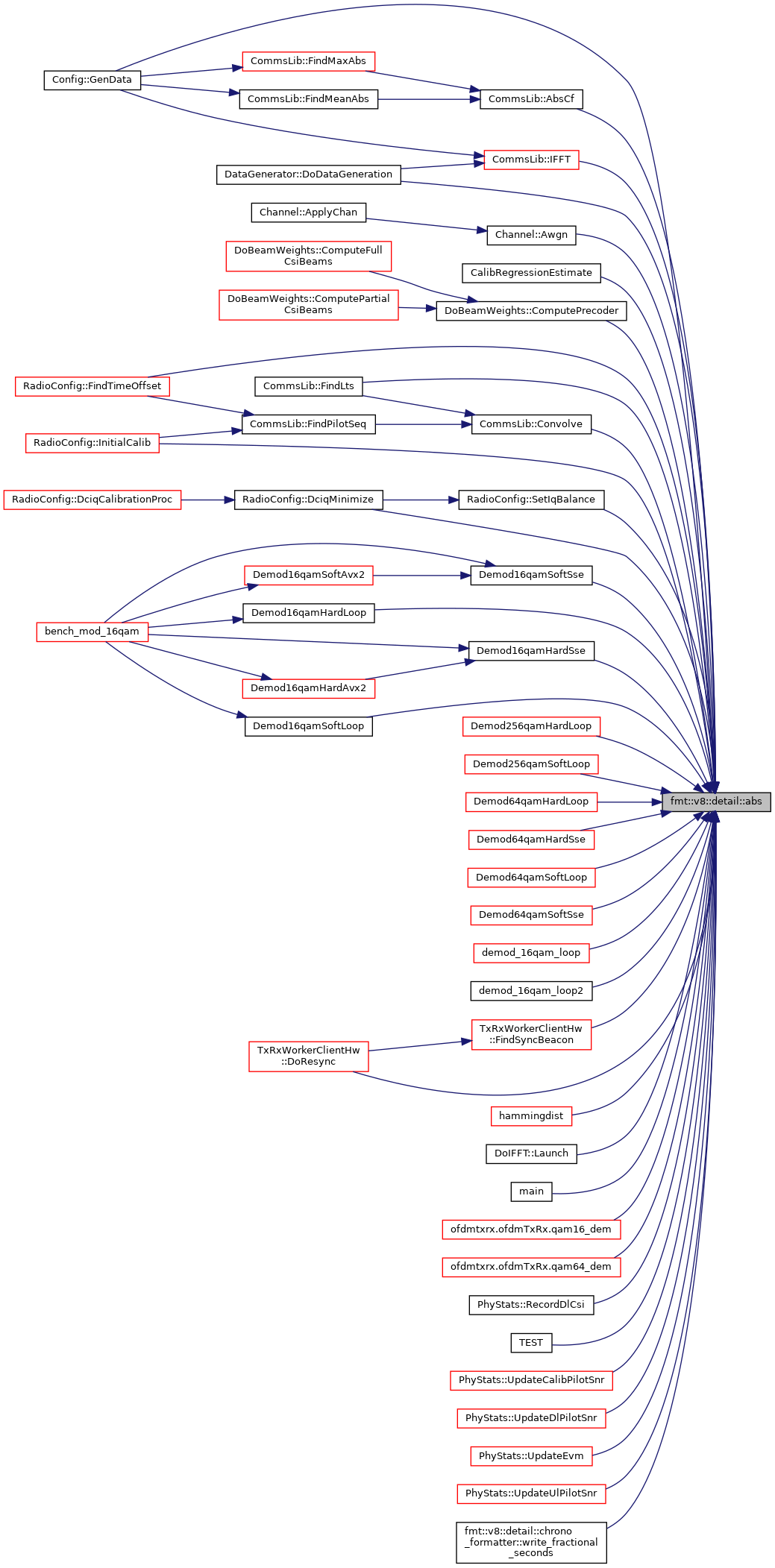
◆ assert_fail()
| void fmt::v8::detail::assert_fail | ( | const char * | file, |
| int | line, | ||
| const char * | message | ||
| ) |
Here is the call graph for this function:

◆ assume()
|
inline |
Here is the call graph for this function:

Here is the caller graph for this function:

◆ base_iterator() [1/2]
template<typename Iterator >
|
constexpr |
Here is the caller graph for this function:
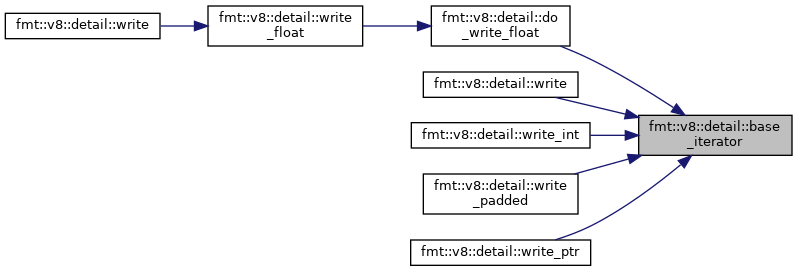
◆ base_iterator() [2/2]
template<typename Container , enable_if_t<(is_contiguous< Container >::value), int > = 0>
|
inline |
Here is the caller graph for this function:

◆ bit_cast()
template<typename To , typename From >
| auto fmt::v8::detail::bit_cast | ( | const From & | from | ) | -> To |
Here is the call graph for this function:

◆ check_char_specs()
template<typename Char , typename ErrorHandler = error_handler>
| auto fmt::v8::detail::check_char_specs | ( | const basic_format_specs< Char > & | specs, |
| ErrorHandler && | eh = {} |
||
| ) | -> bool |
Here is the caller graph for this function:

◆ check_cstring_type_spec()
template<typename ErrorHandler = error_handler>
| auto fmt::v8::detail::check_cstring_type_spec | ( | presentation_type | type, |
| ErrorHandler && | eh = {} |
||
| ) | -> bool |
Here is the caller graph for this function:

◆ check_format_string() [1/2]
template<typename... , typename S , enable_if_t<(!is_compile_string< S >::value), int > = 0>
|
inline |
Here is the caller graph for this function:

◆ check_format_string() [2/2]
template<typename... , typename S , enable_if_t<(is_compile_string< S >::value), int > = 0>
| void fmt::v8::detail::check_format_string | ( | S | format_str | ) |
Here is the call graph for this function:

Here is the caller graph for this function:

◆ check_int_type_spec()
template<typename ErrorHandler >
| void fmt::v8::detail::check_int_type_spec | ( | presentation_type | type, |
| ErrorHandler && | eh | ||
| ) |
Here is the caller graph for this function:

◆ check_pointer_type_spec()
template<typename ErrorHandler >
| void fmt::v8::detail::check_pointer_type_spec | ( | presentation_type | type, |
| ErrorHandler && | eh | ||
| ) |
Here is the caller graph for this function:

◆ check_string_type_spec()
template<typename ErrorHandler = error_handler>
| void fmt::v8::detail::check_string_type_spec | ( | presentation_type | type, |
| ErrorHandler && | eh = {} |
||
| ) |
Here is the caller graph for this function:

◆ code_point_index() [1/2]
template<typename Char >
|
inline |
◆ code_point_index() [2/2]
|
inline |
Here is the caller graph for this function:

◆ code_point_length()
template<typename Char >
| auto fmt::v8::detail::code_point_length | ( | const Char * | begin | ) | -> int |
Here is the call graph for this function:

Here is the caller graph for this function:

◆ compute_width() [1/3]
template<typename Char >
|
inline |
◆ compute_width() [2/3]
|
inline |
Here is the caller graph for this function:

◆ compute_width() [3/3]
|
inline |
Here is the call graph for this function:

◆ const_check()
Here is the call graph for this function:

Here is the caller graph for this function:
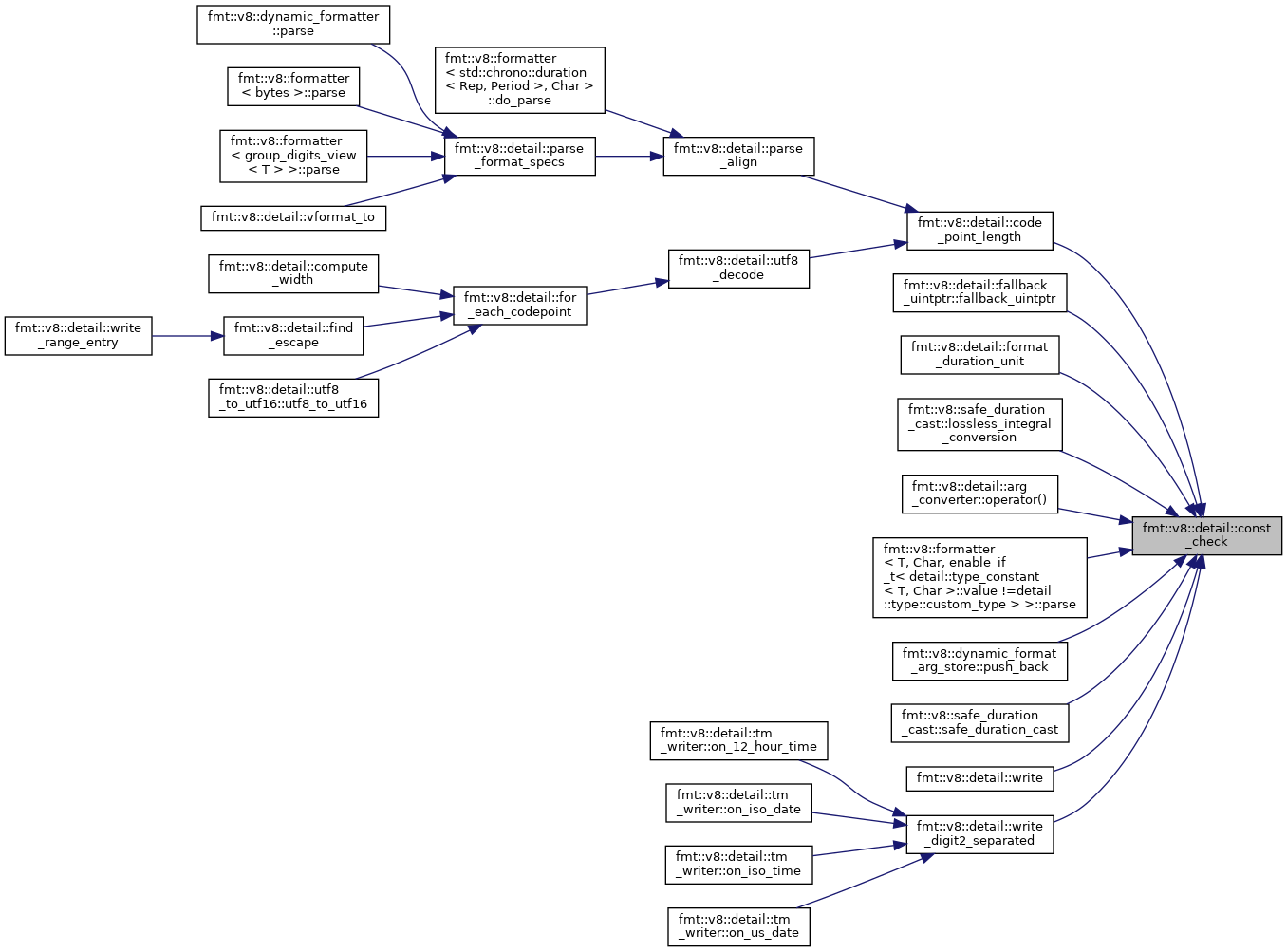
◆ convert_arg()
template<typename T , typename Context , typename Char >
| void fmt::v8::detail::convert_arg | ( | basic_format_arg< Context > & | arg, |
| Char | type | ||
| ) |
Here is the call graph for this function:

Here is the caller graph for this function:

◆ convert_for_visit()
Here is the caller graph for this function:

◆ copy() [1/4]
template<typename OutputIterator >
| OutputIterator fmt::v8::detail::copy | ( | char | ch, |
| OutputIterator | out | ||
| ) |
◆ copy() [2/4]
template<typename OutputIterator >
| OutputIterator fmt::v8::detail::copy | ( | const char * | str, |
| OutputIterator | out | ||
| ) |
◆ copy() [3/4]
template<typename RangeT , typename OutputIterator >
| OutputIterator fmt::v8::detail::copy | ( | const RangeT & | range, |
| OutputIterator | out | ||
| ) |
Here is the call graph for this function:

Here is the caller graph for this function:
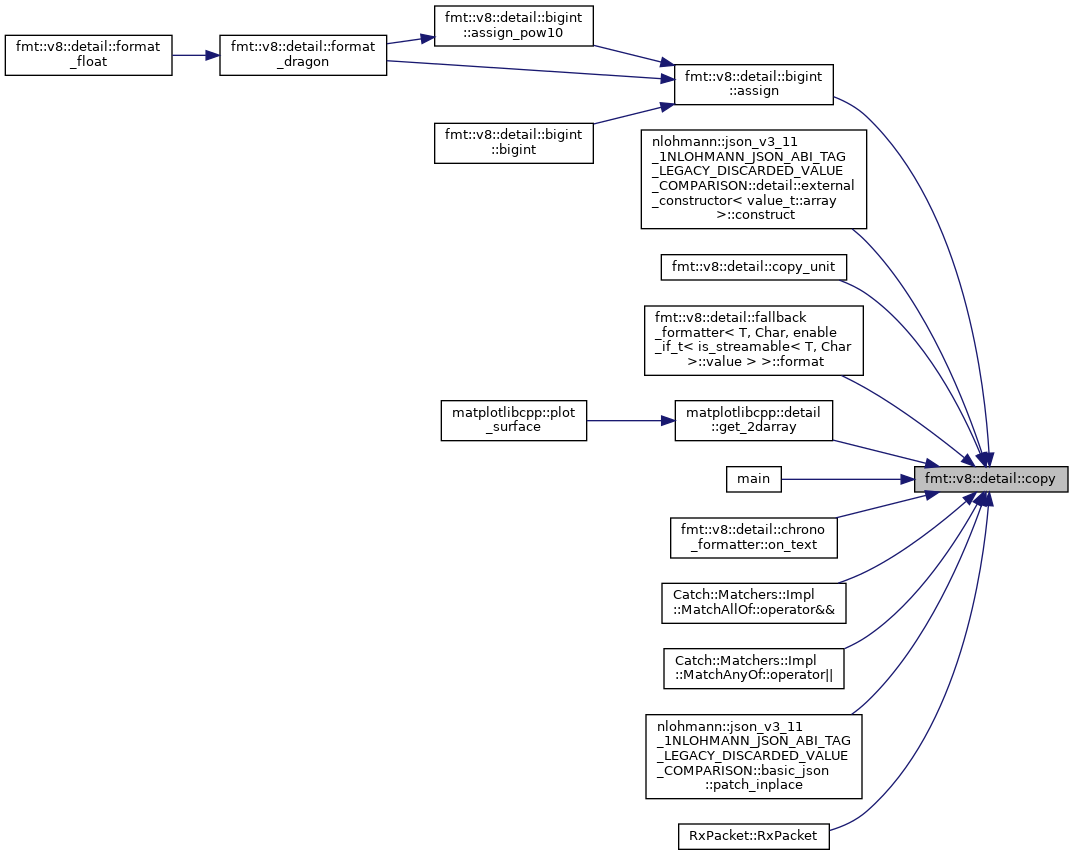
◆ copy() [4/4]
template<typename OutputIterator >
| OutputIterator fmt::v8::detail::copy | ( | wchar_t | ch, |
| OutputIterator | out | ||
| ) |
Here is the caller graph for this function:

◆ copy2()
template<typename Char >
|
inline |
Here is the call graph for this function:

Here is the caller graph for this function:
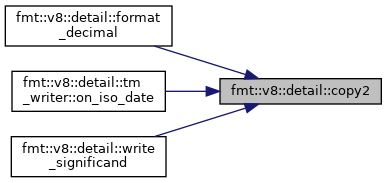
◆ copy_str() [1/4]
template<typename Char , typename InputIt >
| auto fmt::v8::detail::copy_str | ( | InputIt | begin, |
| InputIt | end, | ||
| appender | out | ||
| ) | -> appender |
Here is the call graph for this function:
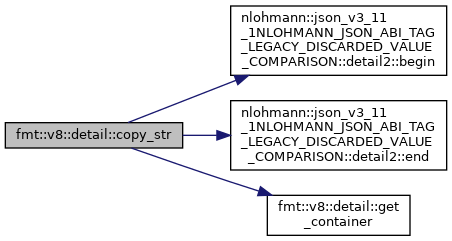
◆ copy_str() [2/4]
template<typename Char , typename InputIt >
|
inline |
Here is the call graph for this function:

◆ copy_str() [3/4]
template<typename Char , typename InputIt , typename OutputIt >
| auto fmt::v8::detail::copy_str | ( | InputIt | begin, |
| InputIt | end, | ||
| OutputIt | out | ||
| ) | -> OutputIt |
Here is the call graph for this function:

◆ copy_str() [4/4]
template<typename Char , typename T , typename U , enable_if_t<(std::is_same< remove_const_t< T >, U >::value &&is_char< U >::value), int > = 0>
| auto fmt::v8::detail::copy_str | ( | T * | begin, |
| T * | end, | ||
| U * | out | ||
| ) | -> U* |
Here is the call graph for this function:
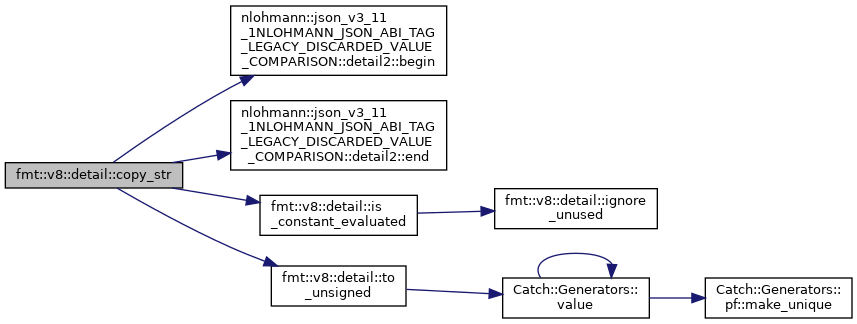
◆ copy_str_noinline()
template<typename OutChar , typename InputIt , typename OutputIt >
| auto fmt::v8::detail::copy_str_noinline | ( | InputIt | begin, |
| InputIt | end, | ||
| OutputIt | out | ||
| ) | -> OutputIt |
Here is the call graph for this function:

◆ copy_unit() [1/2]
template<typename Char , typename OutputIt >
| OutputIt fmt::v8::detail::copy_unit | ( | string_view | unit, |
| OutputIt | out, | ||
| Char | |||
| ) |
Here is the call graph for this function:

◆ copy_unit() [2/2]
template<typename OutputIt >
| OutputIt fmt::v8::detail::copy_unit | ( | string_view | unit, |
| OutputIt | out, | ||
| wchar_t | |||
| ) |
Here is the call graph for this function:

Here is the caller graph for this function:

◆ count() [1/2]
template<bool B = false>
|
constexpr |
◆ count() [2/2]
template<bool B1, bool B2, bool... Tail>
|
constexpr |
Here is the caller graph for this function:

◆ count_digits() [1/3]
template<int BITS, typename UInt >
| auto fmt::v8::detail::count_digits | ( | UInt | n | ) | -> int |
◆ count_digits() [2/3]
|
inline |
Here is the call graph for this function:

Here is the caller graph for this function:

◆ count_digits() [3/3]
|
inline |
Here is the call graph for this function:

Here is the caller graph for this function:

◆ count_digits< 4 >()
template<>
| auto fmt::v8::detail::count_digits< 4 > | ( | detail::fallback_uintptr | n | ) |
Here is the caller graph for this function:

◆ count_digits_fallback()
template<typename T >
| auto fmt::v8::detail::count_digits_fallback | ( | T | n | ) | -> int |
Here is the caller graph for this function:

◆ count_fractional_digits()
|
constexpr |
Here is the caller graph for this function:

◆ count_named_args()
template<typename... Args>
|
constexpr |
Here is the call graph for this function:

◆ count_statically_named_args()
template<typename... Args>
|
constexpr |
Here is the call graph for this function:

◆ decimal_point() [1/2]
template<typename Char >
|
inline |
Here is the caller graph for this function:

◆ decimal_point() [2/2]
template<>
|
inline |
Here is the caller graph for this function:

◆ decimal_point_impl() [1/2]
template<typename Char >
| template auto fmt::v8::detail::decimal_point_impl | ( | locale_ref | loc | ) |
Here is the call graph for this function:

◆ decimal_point_impl() [2/2]
template<typename Char >
| auto fmt::v8::detail::decimal_point_impl | ( | locale_ref | loc | ) | -> Char |
Here is the call graph for this function:

◆ digits10()
template<typename Int >
|
constexpr | |||||||||||||
Here is the caller graph for this function:

◆ digits10< int128_t >()
template<>
|
constexpr | |||||||||||||
◆ digits10< uint128_t >()
template<>
|
constexpr | |||||||||||||
◆ digits2()
|
constexpr |
Here is the caller graph for this function:

◆ do_parse_arg_id()
template<typename Char , typename IDHandler >
| auto fmt::v8::detail::do_parse_arg_id | ( | const Char * | begin, |
| const Char * | end, | ||
| IDHandler && | handler | ||
| ) | -> const Char* |
Here is the call graph for this function:

Here is the caller graph for this function:

◆ do_write()
template<typename Char >
|
inline |
Here is the call graph for this function:

◆ do_write_float()
template<typename OutputIt , typename DecimalFP , typename Char , typename Grouping = digit_grouping<Char>>
| auto fmt::v8::detail::do_write_float | ( | OutputIt | out, |
| const DecimalFP & | fp, | ||
| const basic_format_specs< Char > & | specs, | ||
| float_specs | fspecs, | ||
| locale_ref | loc | ||
| ) | -> OutputIt |
Here is the call graph for this function:

Here is the caller graph for this function:

◆ encode_types() [1/2]
template<typename >
|
constexpr |
◆ encode_types() [2/2]
template<typename Context , typename Arg , typename... Args>
|
constexpr |
◆ equal2() [1/2]
template<typename Char >
| auto fmt::v8::detail::equal2 | ( | const Char * | lhs, |
| const char * | rhs | ||
| ) | -> bool |
◆ equal2() [2/2]
|
inline |
Here is the caller graph for this function:

◆ exponent_mask()
template<typename T >
|
constexpr |
Here is the caller graph for this function:

◆ fill()
template<typename OutputIt , typename Char >
| auto fmt::v8::detail::fill | ( | OutputIt | it, |
| size_t | n, | ||
| const fill_t< Char > & | fill | ||
| ) | -> OutputIt |
Here is the call graph for this function:

Here is the caller graph for this function:

◆ fill_n() [1/2]
template<typename OutputIt , typename Size , typename T >
| auto fmt::v8::detail::fill_n | ( | OutputIt | out, |
| Size | count, | ||
| const T & | value | ||
| ) | -> OutputIt |
Here is the caller graph for this function:

◆ fill_n() [2/2]
template<typename T , typename Size >
| auto fmt::v8::detail::fill_n | ( | T * | out, |
| Size | count, | ||
| char | value | ||
| ) | -> T* |
Here is the call graph for this function:

Here is the caller graph for this function:

◆ find()
template<bool IS_CONSTEXPR, typename T , typename Ptr = const T*>
| auto fmt::v8::detail::find | ( | Ptr | first, |
| Ptr | last, | ||
| T | value, | ||
| Ptr & | out | ||
| ) | -> bool |
Here is the call graph for this function:

Here is the caller graph for this function:
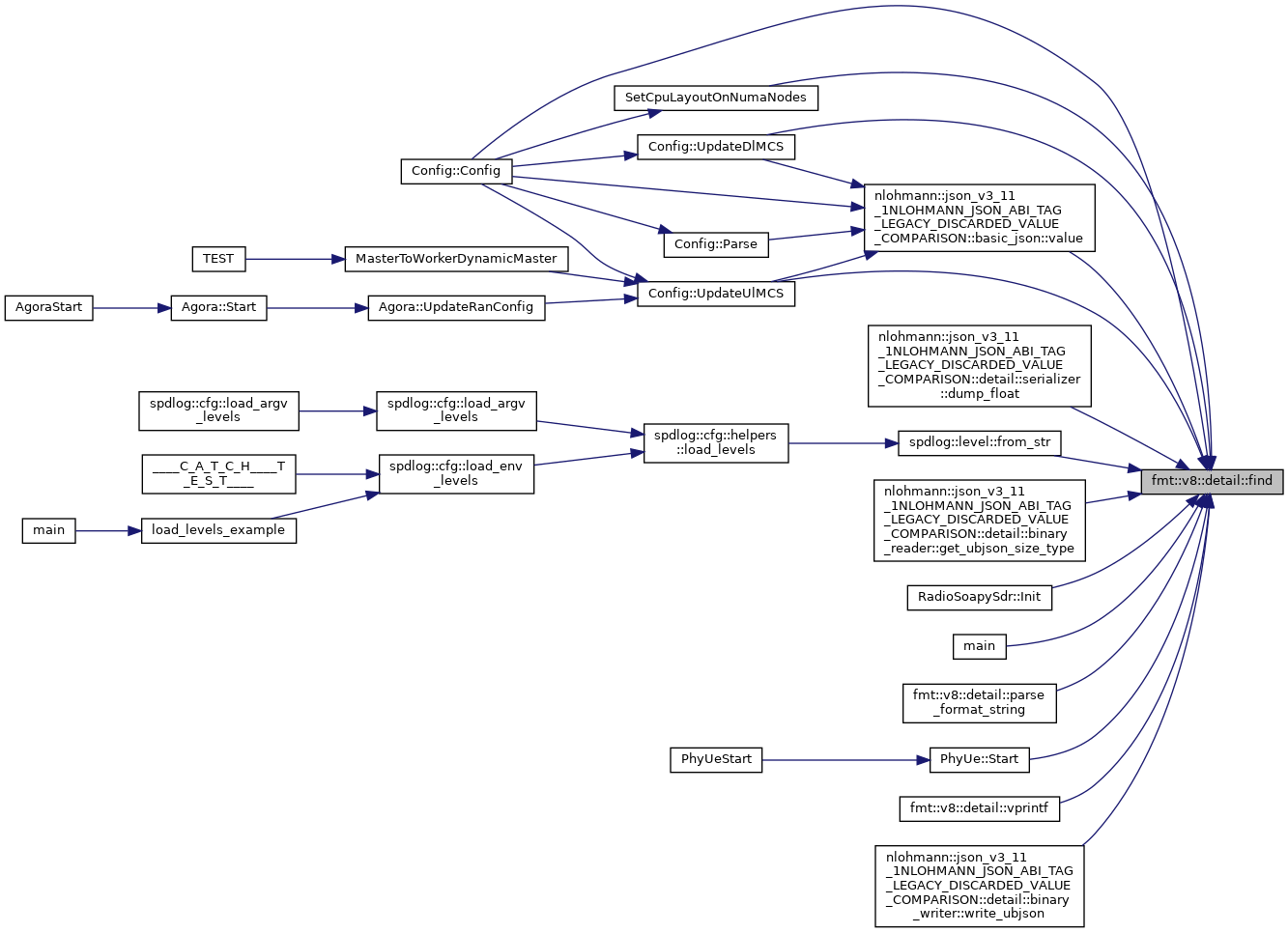
◆ find< false, char >()
template<>
|
inline |
Here is the call graph for this function:

◆ find_escape() [1/2]
template<typename Char >
| auto fmt::v8::detail::find_escape | ( | const Char * | begin, |
| const Char * | end | ||
| ) | -> find_escape_result<Char> |
Here is the call graph for this function:
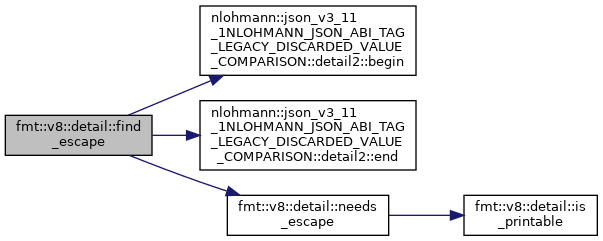
◆ find_escape() [2/2]
|
inline |
Here is the call graph for this function:
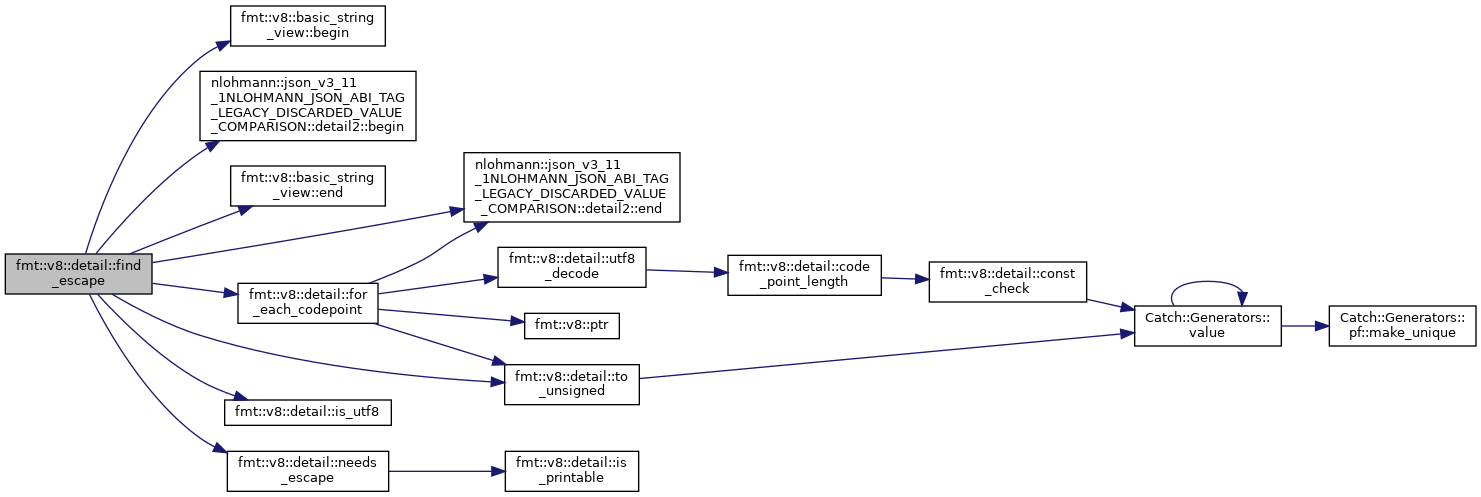
Here is the caller graph for this function:

◆ first()
template<typename T , typename... Tail>
| const T& fmt::v8::detail::first | ( | const T & | value, |
| const Tail & | ... | ||
| ) |
Here is the caller graph for this function:

◆ fmt_safe_duration_cast()
template<typename To , typename FromRep , typename FromPeriod >
| To fmt::v8::detail::fmt_safe_duration_cast | ( | std::chrono::duration< FromRep, FromPeriod > | from | ) |
◆ for_each() [1/2]
template<class Tuple , class F , size_t... Is>
| void fmt::v8::detail::for_each | ( | index_sequence< Is... > | , |
| Tuple && | tup, | ||
| F && | f | ||
| ) | |||
| throw | ( | ||
| ) | |||
Here is the call graph for this function:

◆ for_each() [2/2]
template<class Tuple , class F >
| void fmt::v8::detail::for_each | ( | Tuple && | tup, |
| F && | f | ||
| ) |
Here is the call graph for this function:

Here is the caller graph for this function:

◆ for_each_codepoint()
template<typename F >
| void fmt::v8::detail::for_each_codepoint | ( | string_view | s, |
| F | f | ||
| ) |
Here is the call graph for this function:

Here is the caller graph for this function:

◆ format_decimal() [1/2]
template<typename Char , typename UInt >
| auto fmt::v8::detail::format_decimal | ( | Char * | out, |
| UInt | value, | ||
| int | size | ||
| ) | -> format_decimal_result<Char*> |
Here is the call graph for this function:
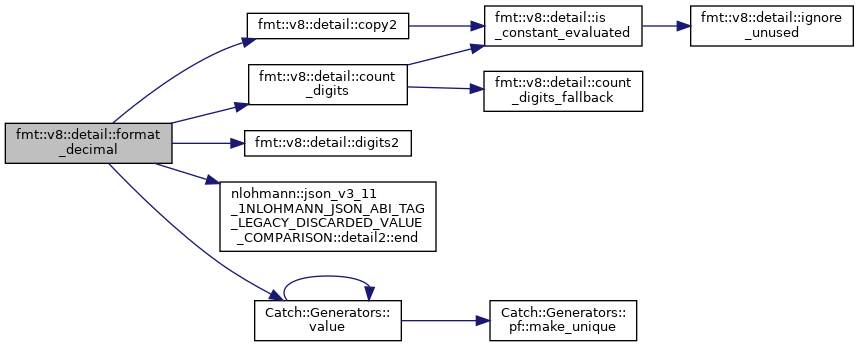
◆ format_decimal() [2/2]
template<typename Char , typename UInt , typename Iterator , enable_if_t<(!std::is_pointer< remove_cvref_t< Iterator >>::value), int > = 0>
|
inline |
Here is the call graph for this function:

Here is the caller graph for this function:
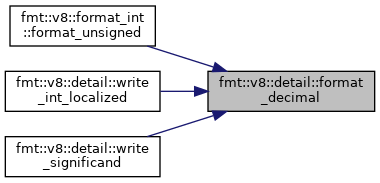
◆ format_dragon()
|
inline |
Here is the call graph for this function:
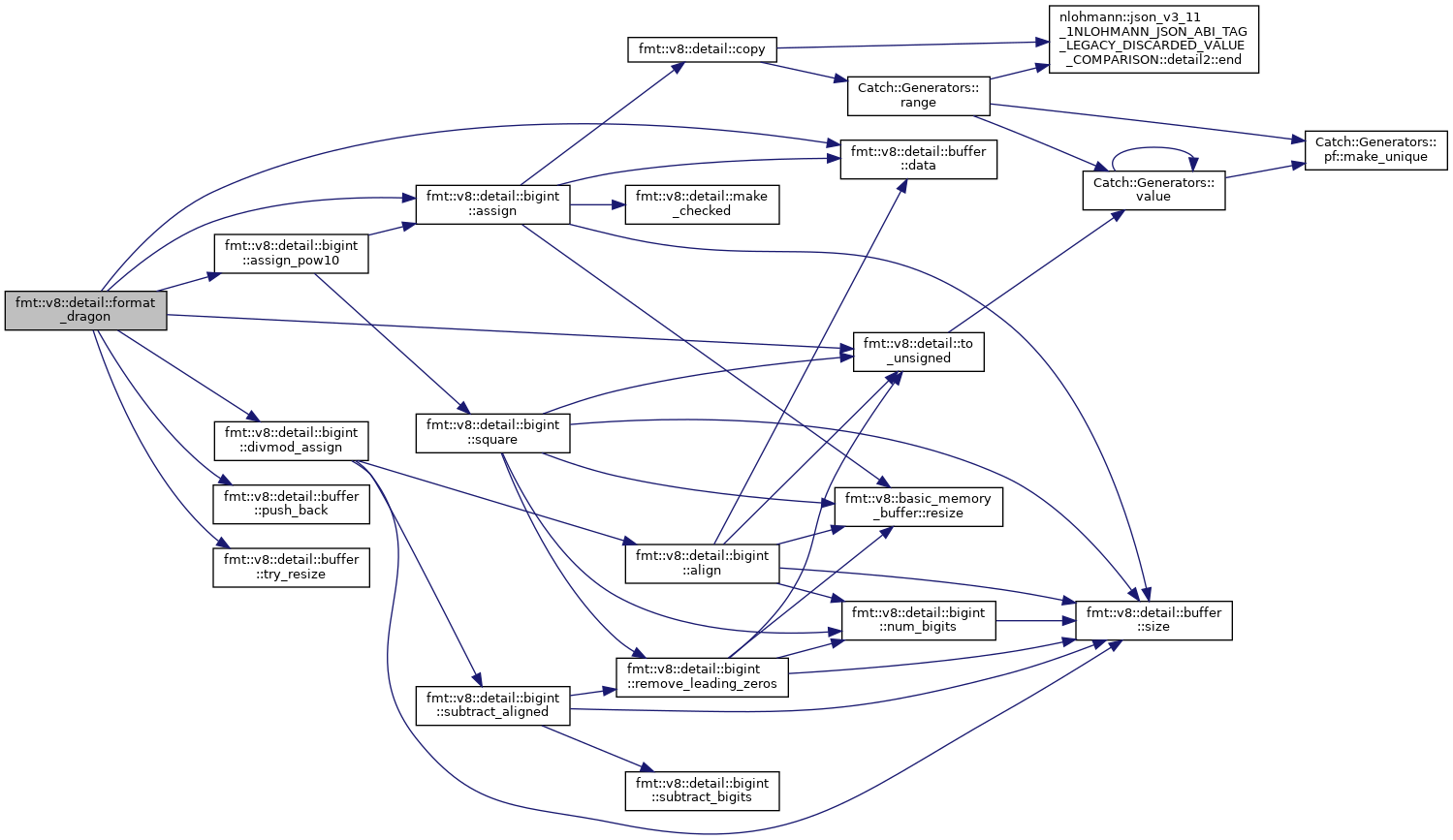
Here is the caller graph for this function:

◆ format_duration_unit()
template<typename Char , typename Period , typename OutputIt >
| OutputIt fmt::v8::detail::format_duration_unit | ( | OutputIt | out | ) |
Here is the call graph for this function:

◆ format_duration_value()
template<typename Char , typename Rep , typename OutputIt , enable_if_t<(std::is_integral< Rep >::value), int > = 0>
| OutputIt fmt::v8::detail::format_duration_value | ( | OutputIt | out, |
| Rep | val, | ||
| int | precision | ||
| ) |
◆ format_error_code()
| void fmt::v8::detail::format_error_code | ( | detail::buffer< char > & | out, |
| int | error_code, | ||
| string_view | message | ||
| ) | |||
| throw | ( | ||
| ) | |||
Here is the call graph for this function:

Here is the caller graph for this function:

◆ format_float() [1/2]
template<typename Float >
| int fmt::v8::detail::format_float | ( | Float | value, |
| int | precision, | ||
| float_specs | specs, | ||
| buffer< char > & | buf | ||
| ) |
Here is the call graph for this function:
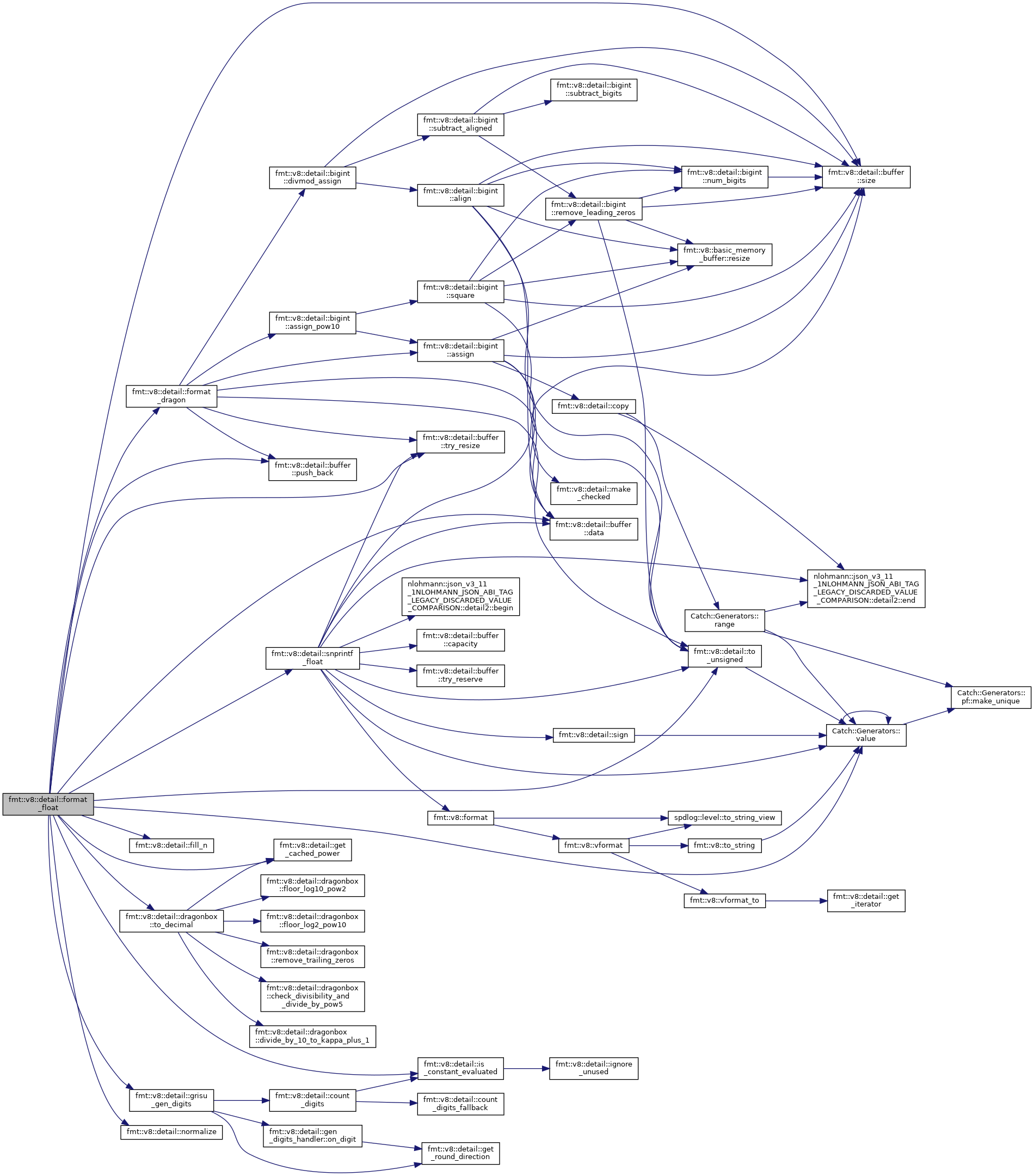
◆ format_float() [2/2]
template<typename T >
| auto fmt::v8::detail::format_float | ( | T | value, |
| int | precision, | ||
| float_specs | specs, | ||
| buffer< char > & | buf | ||
| ) | -> int |
◆ format_float< double >()
| template auto fmt::v8::detail::format_float< double > | ( | double | value, |
| int | precision, | ||
| float_specs | specs, | ||
| buffer< char > & | buf | ||
| ) | -> int |
◆ format_float< long double >()
| template auto fmt::v8::detail::format_float< long double > | ( | long double | value, |
| int | precision, | ||
| float_specs | specs, | ||
| buffer< char > & | buf | ||
| ) | -> int |
◆ format_uint() [1/3]
template<unsigned BASE_BITS, typename Char >
| auto fmt::v8::detail::format_uint | ( | Char * | buffer, |
| detail::fallback_uintptr | n, | ||
| int | num_digits, | ||
| bool | = false |
||
| ) | -> Char* |
◆ format_uint() [2/3]
template<unsigned BASE_BITS, typename Char , typename UInt >
| auto fmt::v8::detail::format_uint | ( | Char * | buffer, |
| UInt | value, | ||
| int | num_digits, | ||
| bool | upper = false |
||
| ) | -> Char* |
Here is the call graph for this function:

◆ format_uint() [3/3]
template<unsigned BASE_BITS, typename Char , typename It , typename UInt >
|
inline |
Here is the call graph for this function:

◆ format_value()
template<typename Char , typename T >
| void fmt::v8::detail::format_value | ( | buffer< Char > & | buf, |
| const T & | value, | ||
| locale_ref | loc = locale_ref() |
||
| ) |
Here is the call graph for this function:

Here is the caller graph for this function:

◆ fputs()
template<typename Char >
|
inline | ||||||||||||||||||||
Here is the caller graph for this function:
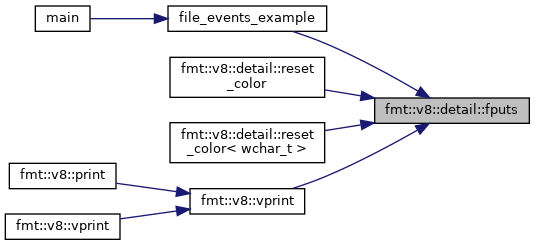
◆ fputs< wchar_t >()
template<>
|
inline | ||||||||||||||||||||
◆ fwrite_fully()
|
inline |
Here is the call graph for this function:

Here is the caller graph for this function:

◆ get_arg()
template<typename Context , typename ID >
| auto fmt::v8::detail::get_arg | ( | Context & | ctx, |
| ID | id | ||
| ) | -> typename Context::format_arg |
Here is the call graph for this function:

Here is the caller graph for this function:

◆ get_arg_index_by_name()
template<typename... Args, typename Char >
| auto fmt::v8::detail::get_arg_index_by_name | ( | basic_string_view< Char > | name | ) | -> int |
Here is the call graph for this function:

Here is the caller graph for this function:

◆ get_buffer()
template<typename T , typename OutputIt >
| auto fmt::v8::detail::get_buffer | ( | OutputIt | out | ) | -> iterator_buffer<OutputIt, T> |
Here is the caller graph for this function:

◆ get_cached_power()
|
inline |
Here is the caller graph for this function:

◆ get_classic_locale()
|
inline |
Here is the caller graph for this function:

◆ get_container()
template<typename Container >
|
inline |
Here is the caller graph for this function:
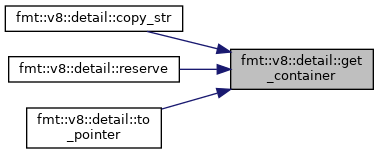
◆ get_data() [1/2]
template<typename Container >
|
inline |
Here is the caller graph for this function:

◆ get_data() [2/2]
template<typename Char >
|
inline |
◆ get_dynamic_spec()
template<template< typename > class Handler, typename FormatArg , typename ErrorHandler >
| auto fmt::v8::detail::get_dynamic_spec | ( | FormatArg | arg, |
| ErrorHandler | eh | ||
| ) | -> int |
Here is the call graph for this function:

◆ get_indexes()
template<class T >
| make_index_sequence<std::tuple_size<T>::value> fmt::v8::detail::get_indexes | ( | T const & | ) |
Here is the caller graph for this function:

◆ get_iterator() [1/2]
template<typename Buffer >
| auto fmt::v8::detail::get_iterator | ( | Buffer & | buf | ) | -> decltype(buf.out()) |
Here is the caller graph for this function:
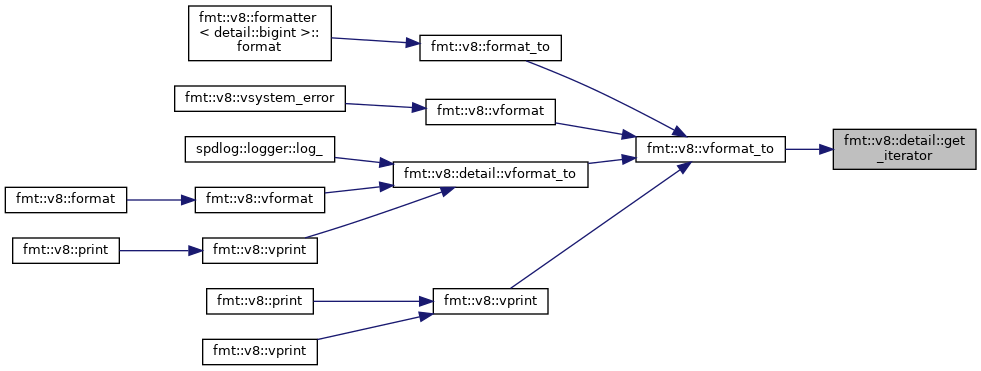
◆ get_iterator() [2/2]
template<typename T >
| auto fmt::v8::detail::get_iterator | ( | buffer< T > & | buf | ) | -> buffer_appender<T> |
Here is the caller graph for this function:

◆ get_milliseconds()
template<typename Rep , typename Period , enable_if_t<(std::is_integral< Rep >::value), int > = 0>
|
inline |
◆ get_round_direction()
|
inline |
Here is the caller graph for this function:

◆ get_significand_size() [1/2]
|
constexpr |
◆ get_significand_size() [2/2]
template<typename T >
|
inline |
Here is the call graph for this function:

Here is the caller graph for this function:

◆ get_units()
template<typename Period >
|
inline |
Here is the call graph for this function:

◆ gmtime_r()
|
inline |
Here is the caller graph for this function:

◆ gmtime_s()
|
inline |
Here is the caller graph for this function:

◆ grisu_gen_digits()
|
inline |
Here is the call graph for this function:

Here is the caller graph for this function:

◆ handle_dynamic_spec()
template<template< typename > class Handler, typename Context >
| void fmt::v8::detail::handle_dynamic_spec | ( | int & | value, |
| arg_ref< typename Context::char_type > | ref, | ||
| Context & | ctx | ||
| ) |
◆ has_const_formatter()
template<typename T , typename Context >
|
constexpr |
◆ has_const_formatter_impl() [1/2]
template<typename Context >
|
constexpr |
◆ has_const_formatter_impl() [2/2]
template<typename Context , typename T >
|
constexpr |
◆ ignore_unused()
template<typename... T>
| void fmt::v8::detail::ignore_unused | ( | const T & | ... | ) |
Here is the caller graph for this function:
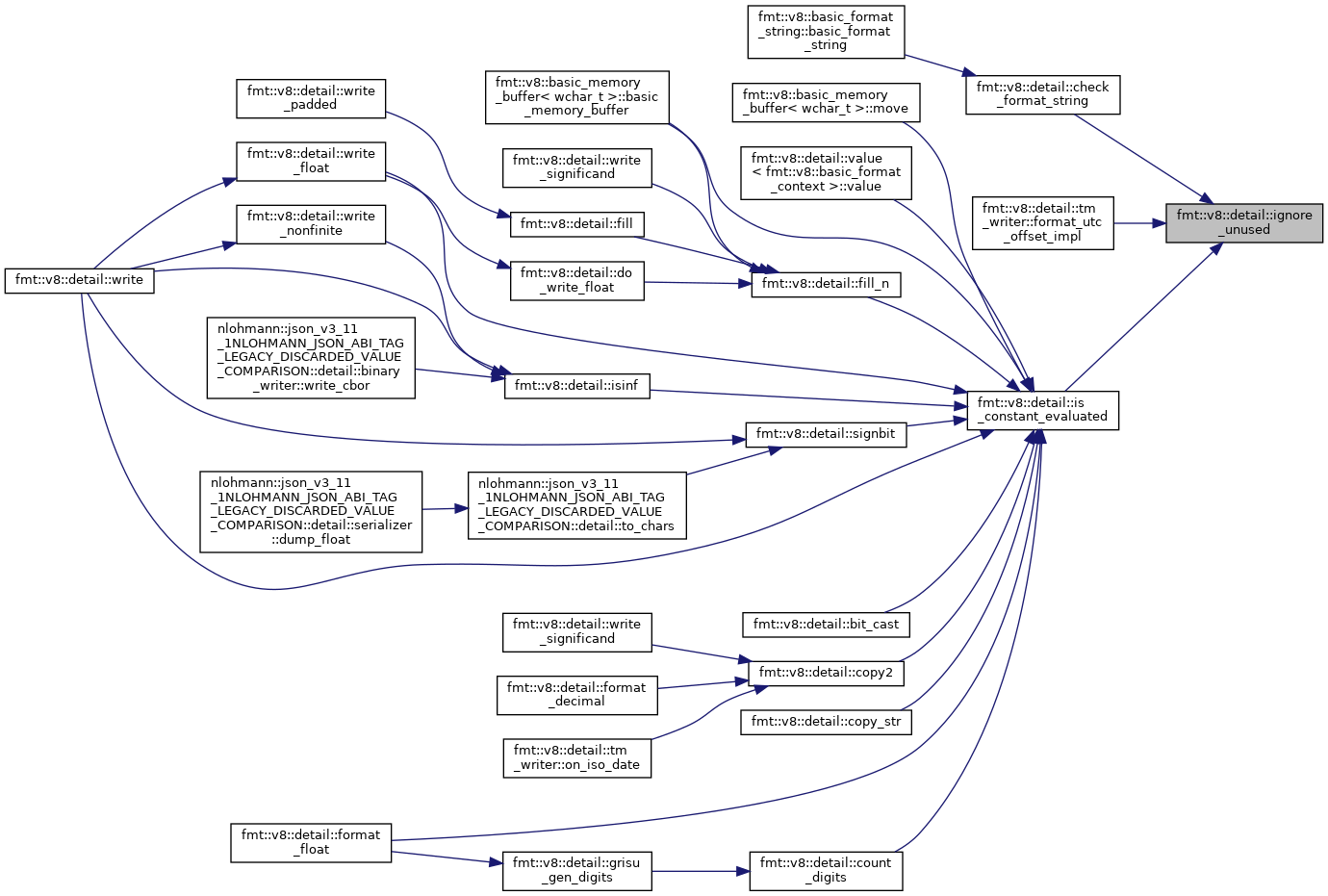
◆ init_named_args() [1/3]
template<typename Char >
|
inline |
◆ init_named_args() [2/3]
template<typename Char , typename T , typename... Tail, enable_if_t<(!is_named_arg< T >::value), int > = 0>
| void fmt::v8::detail::init_named_args | ( | named_arg_info< Char > * | named_args, |
| int | arg_count, | ||
| int | named_arg_count, | ||
| const T & | arg, | ||
| const Tail &... | args | ||
| ) |
Here is the call graph for this function:

◆ init_named_args() [3/3]
template<typename... Args>
|
inline |
Here is the caller graph for this function:

◆ is_arithmetic_type()
|
constexpr |
Here is the caller graph for this function:
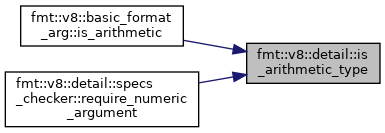
◆ is_ascii_letter()
template<typename Char >
|
constexpr |
Here is the caller graph for this function:

◆ is_big_endian()
|
inline |
Here is the caller graph for this function:
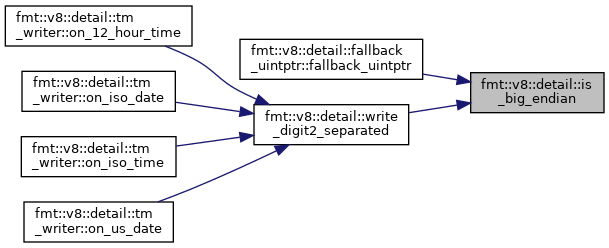
◆ is_constant_evaluated()
|
inlineconstexpr | ||||||||||||||
Here is the call graph for this function:

Here is the caller graph for this function:
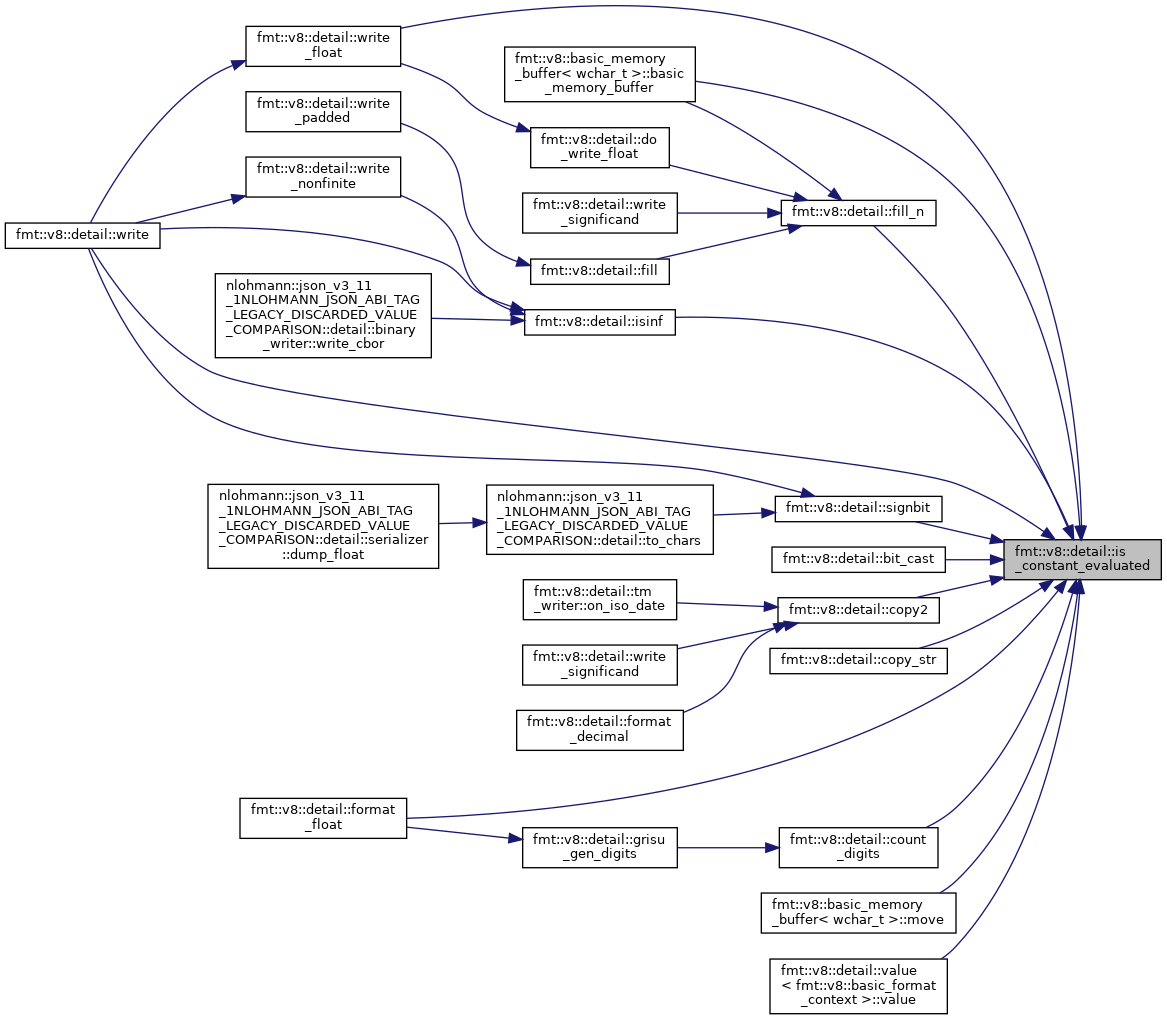
◆ is_integral_type()
|
constexpr |
Here is the caller graph for this function:

◆ is_name_start()
template<typename Char >
| bool fmt::v8::detail::is_name_start | ( | Char | c | ) |
Here is the caller graph for this function:

◆ is_negative()
template<typename T , enable_if_t<(is_signed< T >::value), int > = 0>
| auto fmt::v8::detail::is_negative | ( | T | value | ) | -> bool |
Here is the caller graph for this function:
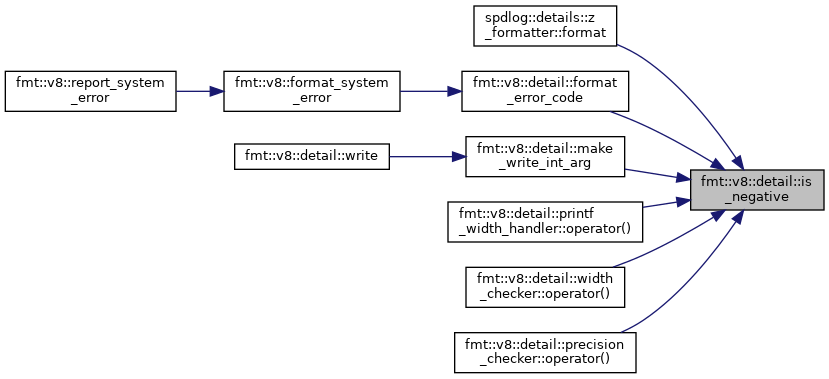
◆ is_printable() [1/2]
|
inline |
◆ is_printable() [2/2]
|
inline |
Here is the caller graph for this function:

◆ is_supported_floating_point()
template<typename T , enable_if_t<(std::is_floating_point< T >::value), int > = 0>
| auto fmt::v8::detail::is_supported_floating_point | ( | T | ) | -> uint16_t |
Here is the call graph for this function:

Here is the caller graph for this function:

◆ is_utf8()
|
constexpr |
Here is the caller graph for this function:

◆ isfinite()
template<typename T , enable_if_t<(std::is_integral< T >::value), int > = 0>
|
inline |
Here is the caller graph for this function:
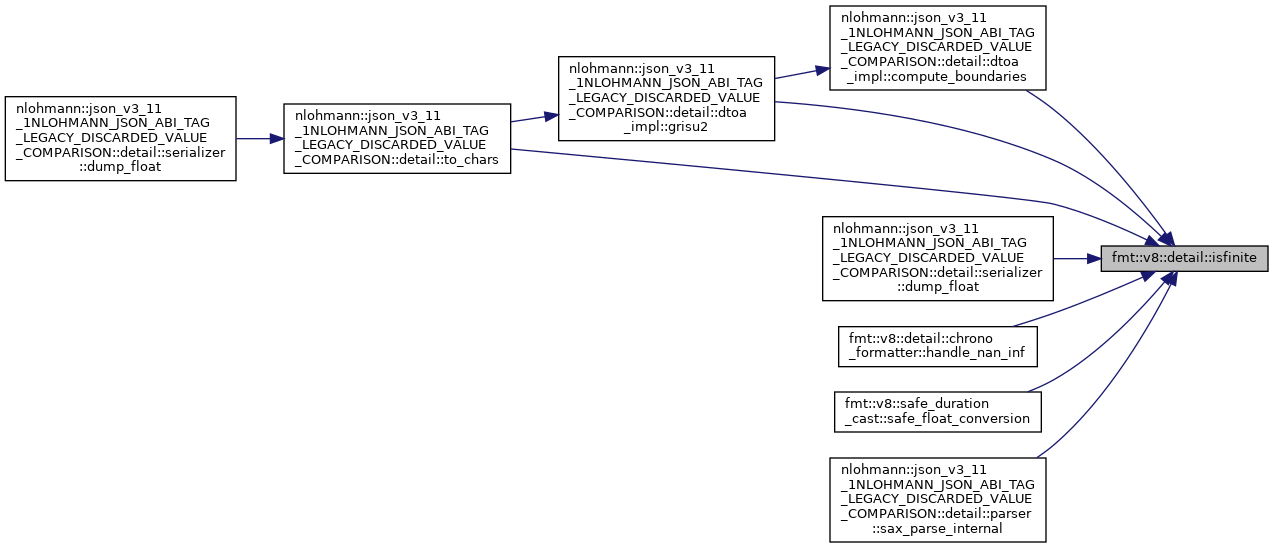
◆ isinf()
template<typename T , enable_if_t<(std::is_floating_point< T >::value), int > = 0>
| bool fmt::v8::detail::isinf | ( | T | value | ) |
Here is the call graph for this function:

Here is the caller graph for this function:

◆ isnan()
template<typename T , enable_if_t<(std::is_integral< T >::value), int > = 0>
|
inline |
Here is the caller graph for this function:
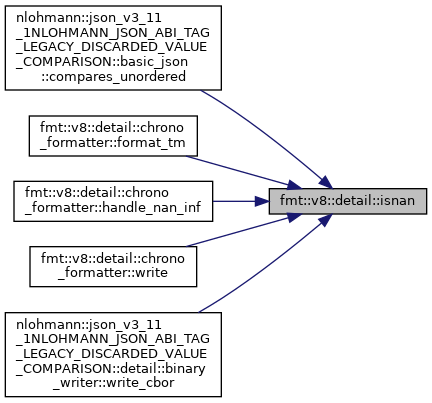
◆ localtime_r()
|
inline |
Here is the caller graph for this function:
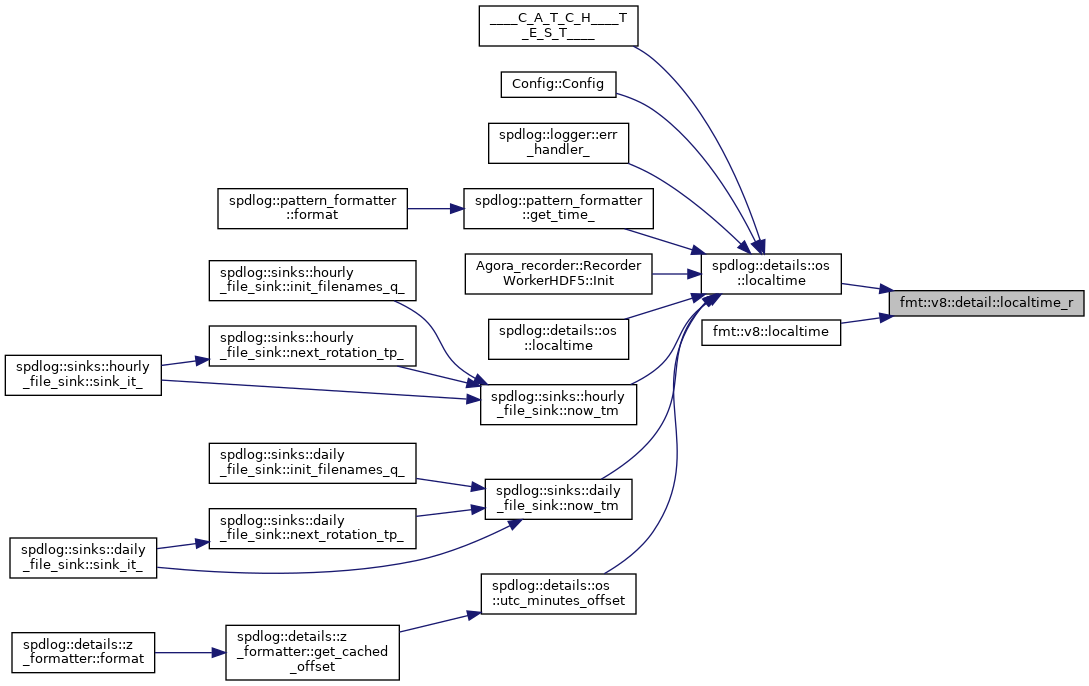
◆ localtime_s()
|
inline |
Here is the caller graph for this function:

◆ make_arg() [1/3]
template<typename Context , typename T >
| auto fmt::v8::detail::make_arg | ( | const T & | value | ) | -> basic_format_arg<Context> |
Here is the call graph for this function:

◆ make_arg() [2/3]
template<bool IS_PACKED, typename Context , type , typename T , enable_if_t<(!IS_PACKED), int > = 0>
|
inline |
Here is the caller graph for this function:

◆ make_arg() [3/3]
template<bool IS_PACKED, typename Context , type , typename T , enable_if_t<(IS_PACKED), int > = 0>
|
inline |
Here is the call graph for this function:

◆ make_background_color()
template<typename Char >
| ansi_color_escape<Char> fmt::v8::detail::make_background_color | ( | detail::color_type | background | ) | |
| throw | ( | ||||
| ) | |||||
◆ make_checked()
template<typename T >
|
constexpr |
Here is the caller graph for this function:

◆ make_emphasis()
template<typename Char >
| ansi_color_escape<Char> fmt::v8::detail::make_emphasis | ( | emphasis | em | ) | |
| throw | ( | ||||
| ) | |||||
◆ make_foreground_color()
template<typename Char >
| ansi_color_escape<Char> fmt::v8::detail::make_foreground_color | ( | detail::color_type | foreground | ) | |
| throw | ( | ||||
| ) | |||||
◆ make_write_int_arg()
template<typename T >
| auto fmt::v8::detail::make_write_int_arg | ( | T | value, |
| sign_t | sign | ||
| ) | -> write_int_arg<uint32_or_64_or_128_t<T>> |
Here is the call graph for this function:

Here is the caller graph for this function:

◆ max_value()
template<typename T >
|
constexpr |
Here is the call graph for this function:

◆ mod()
template<typename T , enable_if_t<(std::is_integral< T >::value), int > = 0>
|
inline |
Here is the caller graph for this function:
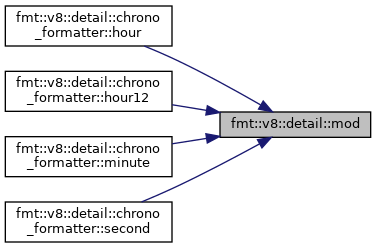
◆ multiply()
|
inline |
Here is the caller graph for this function:

◆ needs_escape()
|
inline |
Here is the call graph for this function:

Here is the caller graph for this function:

◆ normalize()
Here is the caller graph for this function:
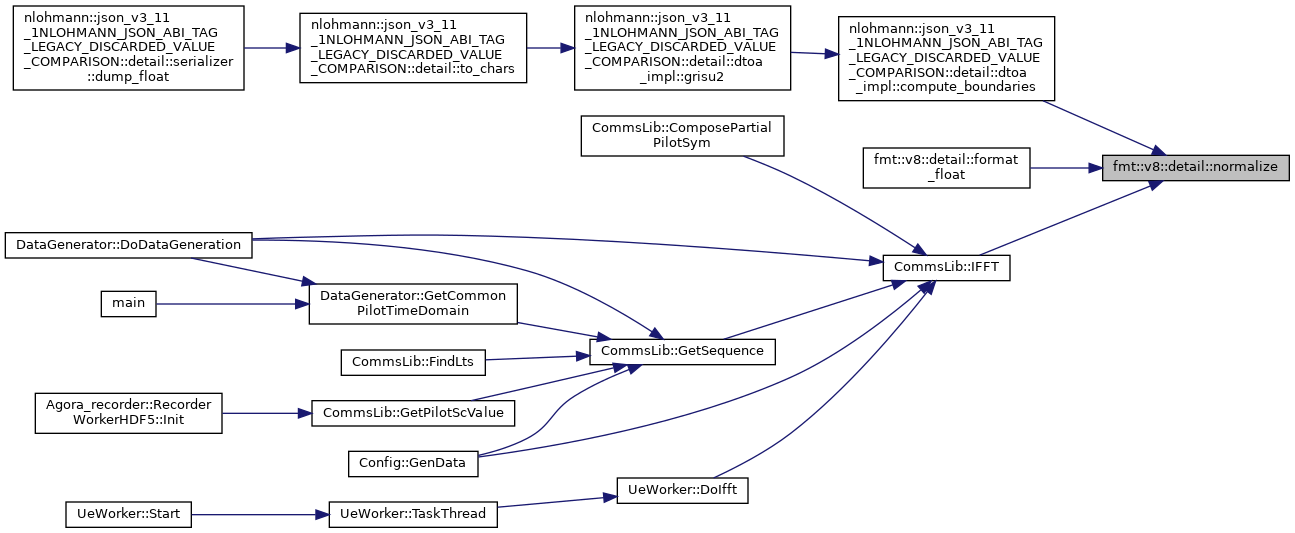
◆ num_bits()
template<typename T >
|
constexpr |
Here is the caller graph for this function:

◆ num_bits< fallback_uintptr >()
template<>
|
constexpr |
◆ num_bits< int128_t >()
template<>
|
constexpr |
◆ num_bits< uint128_t >()
template<>
|
constexpr |
◆ num_significand_bits()
template<typename Float >
|
constexpr |
◆ operator*()
Here is the call graph for this function:

Here is the caller graph for this function:

◆ operator==()
◆ parse_align()
template<typename Char , typename Handler >
| auto fmt::v8::detail::parse_align | ( | const Char * | begin, |
| const Char * | end, | ||
| Handler && | handler | ||
| ) | -> const Char* |
Here is the call graph for this function:

Here is the caller graph for this function:
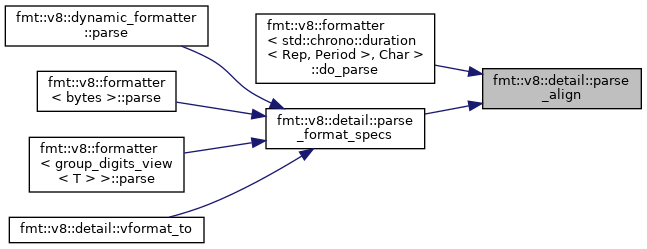
◆ parse_arg_id()
template<typename Char , typename IDHandler >
|
inline |
Here is the call graph for this function:

Here is the caller graph for this function:

◆ parse_chrono_format()
template<typename Char , typename Handler >
| const Char* fmt::v8::detail::parse_chrono_format | ( | const Char * | begin, |
| const Char * | end, | ||
| Handler && | handler | ||
| ) |
Here is the call graph for this function:

Here is the caller graph for this function:
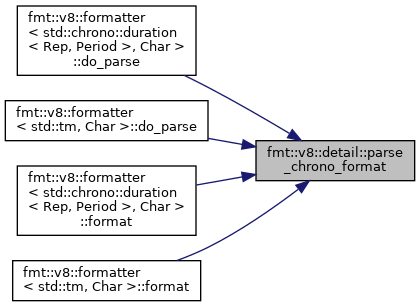
◆ parse_flags()
template<typename Char >
| void fmt::v8::detail::parse_flags | ( | basic_format_specs< Char > & | specs, |
| const Char *& | it, | ||
| const Char * | end | ||
| ) |
Here is the call graph for this function:

Here is the caller graph for this function:

◆ parse_float_type_spec()
template<typename ErrorHandler = error_handler, typename Char >
| auto fmt::v8::detail::parse_float_type_spec | ( | const basic_format_specs< Char > & | specs, |
| ErrorHandler && | eh = {} |
||
| ) | -> float_specs |
Here is the caller graph for this function:

◆ parse_format_specs() [1/2]
template<typename Char , typename SpecHandler >
|
inline |
Here is the call graph for this function:
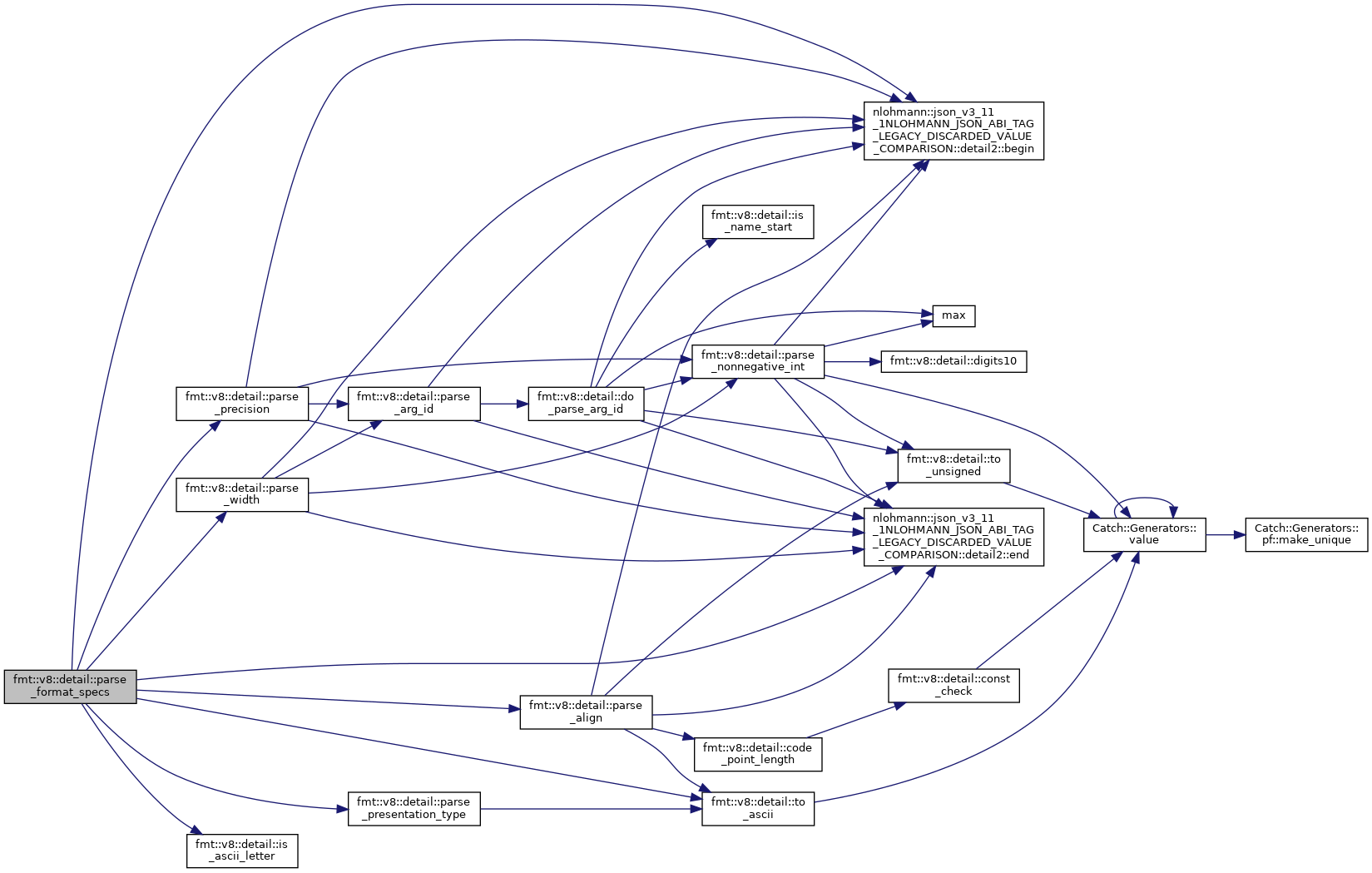
Here is the caller graph for this function:
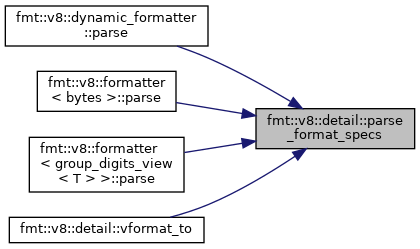
◆ parse_format_specs() [2/2]
template<typename T , typename ParseContext >
| auto fmt::v8::detail::parse_format_specs | ( | ParseContext & | ctx | ) | -> decltype(ctx.begin()) |
Here is the call graph for this function:

Here is the caller graph for this function:

◆ parse_format_string()
template<bool IS_CONSTEXPR, typename Char , typename Handler >
|
inline |
Here is the call graph for this function:

◆ parse_header()
template<typename Char , typename GetArg >
| int fmt::v8::detail::parse_header | ( | const Char *& | it, |
| const Char * | end, | ||
| basic_format_specs< Char > & | specs, | ||
| GetArg | get_arg | ||
| ) |
Here is the call graph for this function:
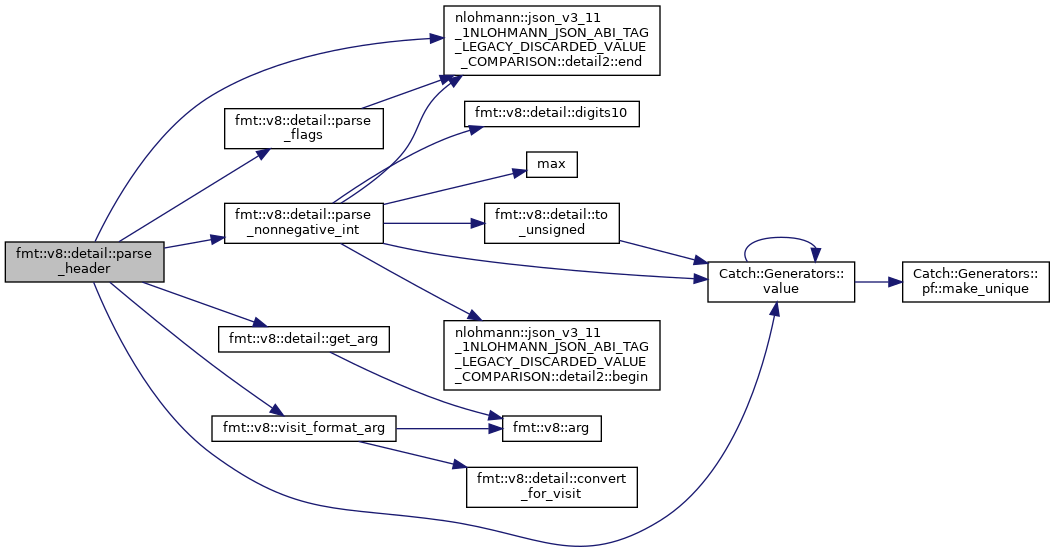
Here is the caller graph for this function:

◆ parse_nonnegative_int()
template<typename Char >
|
noexcept |
Here is the call graph for this function:
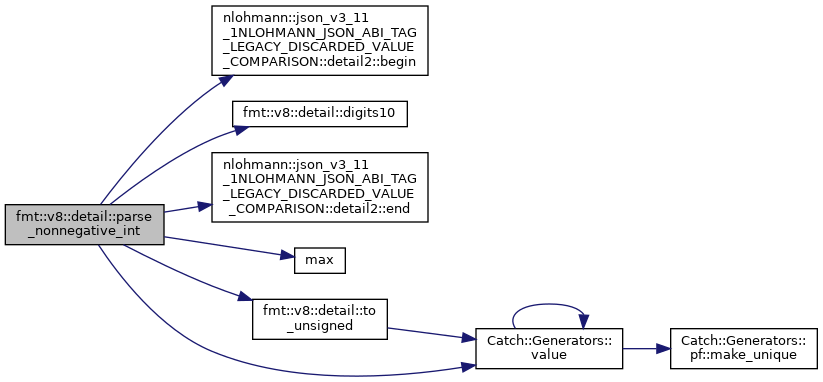
Here is the caller graph for this function:

◆ parse_precision()
template<typename Char , typename Handler >
| auto fmt::v8::detail::parse_precision | ( | const Char * | begin, |
| const Char * | end, | ||
| Handler && | handler | ||
| ) | -> const Char* |
Here is the call graph for this function:

Here is the caller graph for this function:
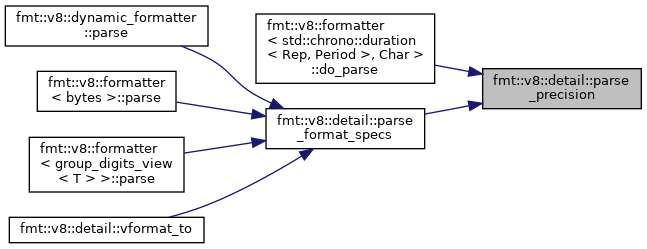
◆ parse_presentation_type()
template<typename Char >
| auto fmt::v8::detail::parse_presentation_type | ( | Char | type | ) | -> presentation_type |
Here is the call graph for this function:

Here is the caller graph for this function:
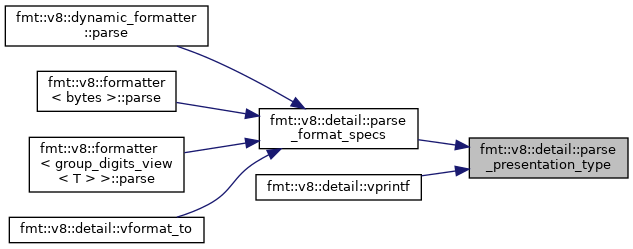
◆ parse_replacement_field()
template<typename Char , typename Handler >
| auto fmt::v8::detail::parse_replacement_field | ( | const Char * | begin, |
| const Char * | end, | ||
| Handler && | handler | ||
| ) | -> const Char* |
Here is the call graph for this function:

Here is the caller graph for this function:

◆ parse_width()
template<typename Char , typename Handler >
| auto fmt::v8::detail::parse_width | ( | const Char * | begin, |
| const Char * | end, | ||
| Handler && | handler | ||
| ) | -> const Char* |
Here is the call graph for this function:

Here is the caller graph for this function:
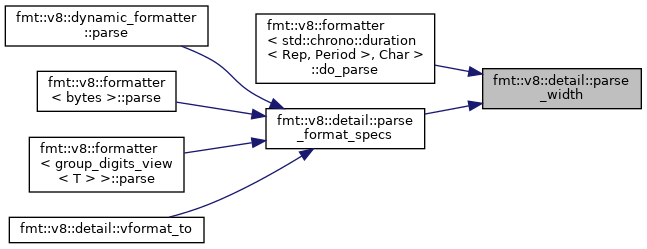
◆ pow10()
|
constexpr |
Here is the caller graph for this function:

◆ prefix_append()
|
inline |
Here is the call graph for this function:

Here is the caller graph for this function:

◆ print()
| void fmt::v8::detail::print | ( | std::FILE * | f, |
| string_view | text | ||
| ) |
Here is the call graph for this function:

Here is the caller graph for this function:

◆ promote_float() [1/2]
|
constexpr |
Here is the call graph for this function:

◆ promote_float() [2/2]
Here is the call graph for this function:

◆ range_begin() [1/2]
template<typename T , std::size_t N>
| auto fmt::v8::detail::range_begin | ( | const T(&) | arr[N] | ) | -> const T* |
Here is the caller graph for this function:

◆ range_begin() [2/2]
template<typename T >
| auto fmt::v8::detail::range_begin | ( | T && | rng | ) | -> decltype( static_cast<T&&>(rng).begin() ) |
◆ range_end() [1/2]
template<typename T , std::size_t N>
| auto fmt::v8::detail::range_end | ( | const T(&) | arr[N] | ) | -> const T* |
Here is the caller graph for this function:

◆ range_end() [2/2]
template<typename T >
| auto fmt::v8::detail::range_end | ( | T && | rng | ) | -> decltype( static_cast<T&&>(rng).end() ) |
◆ report_error()
| void fmt::v8::detail::report_error | ( | format_func | func, |
| int | error_code, | ||
| const char * | message | ||
| ) | |||
| throw | ( | ||
| ) | |||
Here is the call graph for this function:

Here is the caller graph for this function:

◆ reserve() [1/3]
template<typename T >
|
inline |
Here is the call graph for this function:
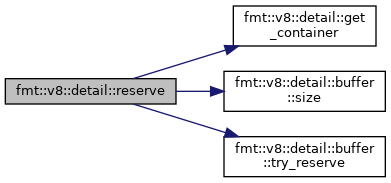
◆ reserve() [2/3]
template<typename Iterator >
|
constexpr |
Here is the caller graph for this function:

◆ reserve() [3/3]
template<typename Container , enable_if_t<(is_contiguous< Container >::value), int > = 0>
|
inline |
Here is the call graph for this function:
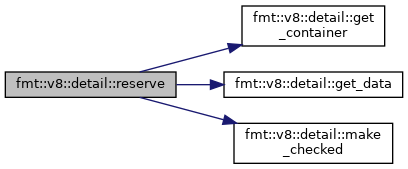
◆ reset_color() [1/2]
template<typename Char >
|
inline | ||||||||||||||
Here is the call graph for this function:

◆ reset_color() [2/2]
template<typename Char >
|
inline | ||||||||||||||
Here is the call graph for this function:

◆ reset_color< wchar_t >()
template<>
|
inline | ||||||||||||||
Here is the call graph for this function:

◆ sign()
template<typename Char , typename Sign >
|
constexpr |
Here is the call graph for this function:

Here is the caller graph for this function:
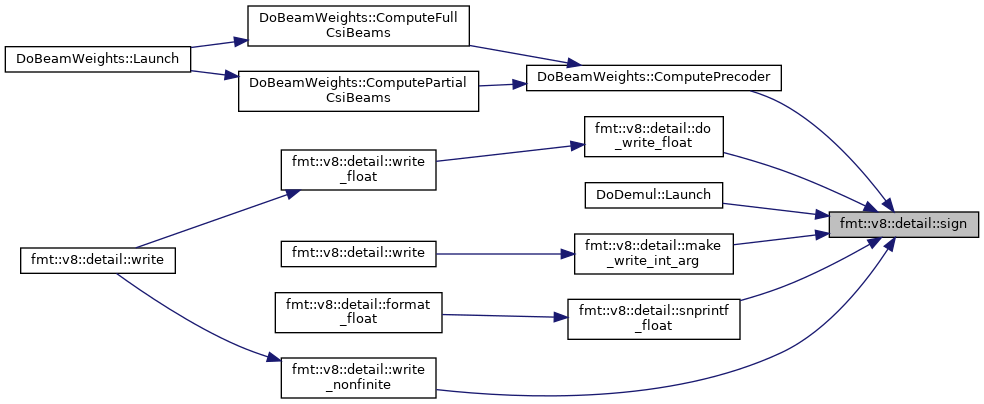
◆ signbit()
template<typename T , enable_if_t<(std::is_floating_point< T >::value), int > = 0>
|
inline |
Here is the call graph for this function:

Here is the caller graph for this function:

◆ snprintf_float() [1/3]
|
delete |
◆ snprintf_float() [2/3]
template<typename T >
| int fmt::v8::detail::snprintf_float | ( | T | value, |
| int | precision, | ||
| float_specs | specs, | ||
| buffer< char > & | buf | ||
| ) |
Here is the call graph for this function:

Here is the caller graph for this function:

◆ snprintf_float() [3/3]
template<typename T >
| auto fmt::v8::detail::snprintf_float | ( | T | value, |
| int | precision, | ||
| float_specs | specs, | ||
| buffer< char > & | buf | ||
| ) | -> int |
Here is the call graph for this function:
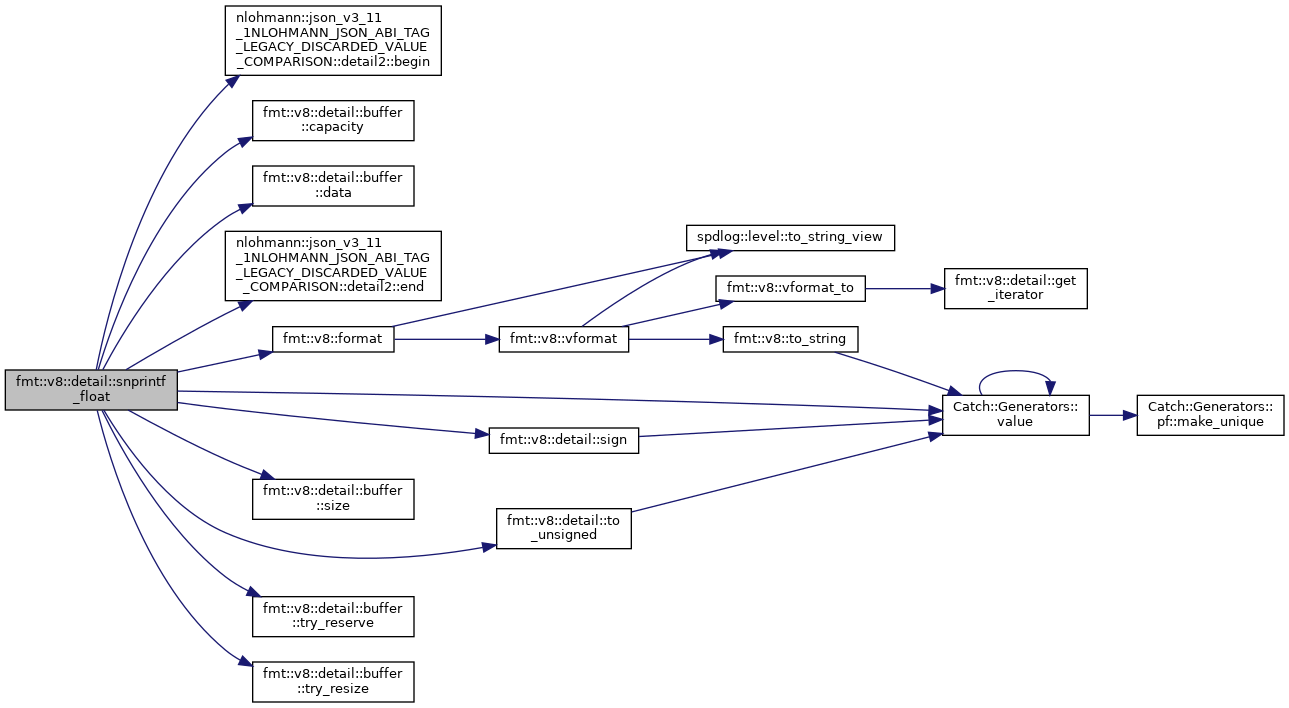
Here is the caller graph for this function:

◆ snprintf_float< double >()
| template auto fmt::v8::detail::snprintf_float< double > | ( | double | value, |
| int | precision, | ||
| float_specs | specs, | ||
| buffer< char > & | buf | ||
| ) | -> int |
◆ snprintf_float< long double >()
| template auto fmt::v8::detail::snprintf_float< long double > | ( | long double | value, |
| int | precision, | ||
| float_specs | specs, | ||
| buffer< char > & | buf | ||
| ) | -> int |
◆ thousands_sep() [1/2]
template<typename Char >
|
inline |
Here is the call graph for this function:

Here is the caller graph for this function:

◆ thousands_sep() [2/2]
template<>
|
inline |
Here is the call graph for this function:

◆ thousands_sep_impl()
template<typename Char >
| auto fmt::v8::detail::thousands_sep_impl | ( | locale_ref | loc | ) | -> thousands_sep_result< Char > |
Here is the call graph for this function:

◆ thousands_sep_impl< char >()
| template auto fmt::v8::detail::thousands_sep_impl< char > | ( | locale_ref | ) | -> thousands_sep_result< char > |
Here is the caller graph for this function:

◆ thousands_sep_impl< wchar_t >()
| template auto fmt::v8::detail::thousands_sep_impl< wchar_t > | ( | locale_ref | ) | -> thousands_sep_result< wchar_t > |
Here is the caller graph for this function:

◆ throw_format_error()
| void fmt::v8::detail::throw_format_error | ( | const char * | message | ) |
Here is the caller graph for this function:

◆ tm_mon_full_name()
|
inline |
Here is the caller graph for this function:

◆ tm_mon_short_name()
|
inline |
Here is the caller graph for this function:

◆ tm_wday_full_name()
|
inline |
Here is the caller graph for this function:

◆ tm_wday_short_name()
|
inline |
Here is the caller graph for this function:

◆ to_ascii()
template<typename Char , enable_if_t<(std::is_integral< Char >::value), int > = 0>
|
constexpr |
Here is the call graph for this function:

Here is the caller graph for this function:

◆ to_nonnegative_int()
template<typename T , typename Int , enable_if_t<(std::is_integral< T >::value), int > = 0>
|
inline |
Here is the call graph for this function:

Here is the caller graph for this function:
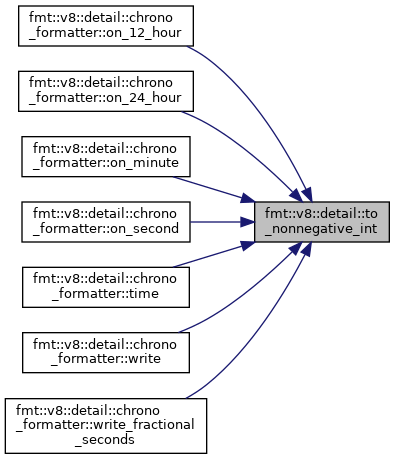
◆ to_pointer() [1/2]
template<typename T >
| auto fmt::v8::detail::to_pointer | ( | buffer_appender< T > | it, |
| size_t | n | ||
| ) | -> T* |
Here is the call graph for this function:
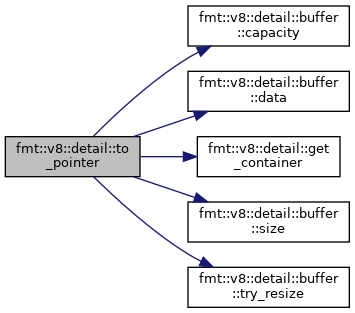
◆ to_pointer() [2/2]
template<typename T , typename OutputIt >
|
constexpr |
◆ to_string_view()
| void fmt::v8::detail::to_string_view | ( | ... | ) |
Here is the caller graph for this function:

◆ to_uintptr()
|
inline |
Here is the caller graph for this function:

◆ to_unsigned()
template<typename Int >
| auto fmt::v8::detail::to_unsigned | ( | Int | value | ) | -> typename std::make_unsigned<Int>::type |
Here is the call graph for this function:

Here is the caller graph for this function:

◆ unwrap() [1/2]
Here is the caller graph for this function:

◆ unwrap() [2/2]
◆ utf8_decode()
|
inline |
Here is the call graph for this function:

Here is the caller graph for this function:

◆ vformat()
template<typename Locale , typename Char >
| auto fmt::v8::detail::vformat | ( | const Locale & | loc, |
| basic_string_view< Char > | format_str, | ||
| basic_format_args< buffer_context< type_identity_t< Char >>> | args | ||
| ) | -> std::basic_string<Char> |
Here is the call graph for this function:
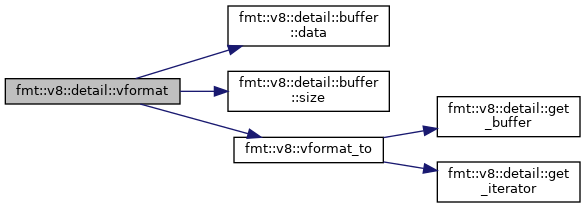
◆ vformat_to() [1/2]
template<typename Char >
| void fmt::v8::detail::vformat_to | ( | buffer< Char > & | buf, |
| basic_string_view< Char > | fmt, | ||
| basic_format_args< basic_format_context< detail::buffer_appender< type_identity_t< Char > >, type_identity_t< Char > >> | args, | ||
| locale_ref | loc = {} |
||
| ) |
Here is the call graph for this function:
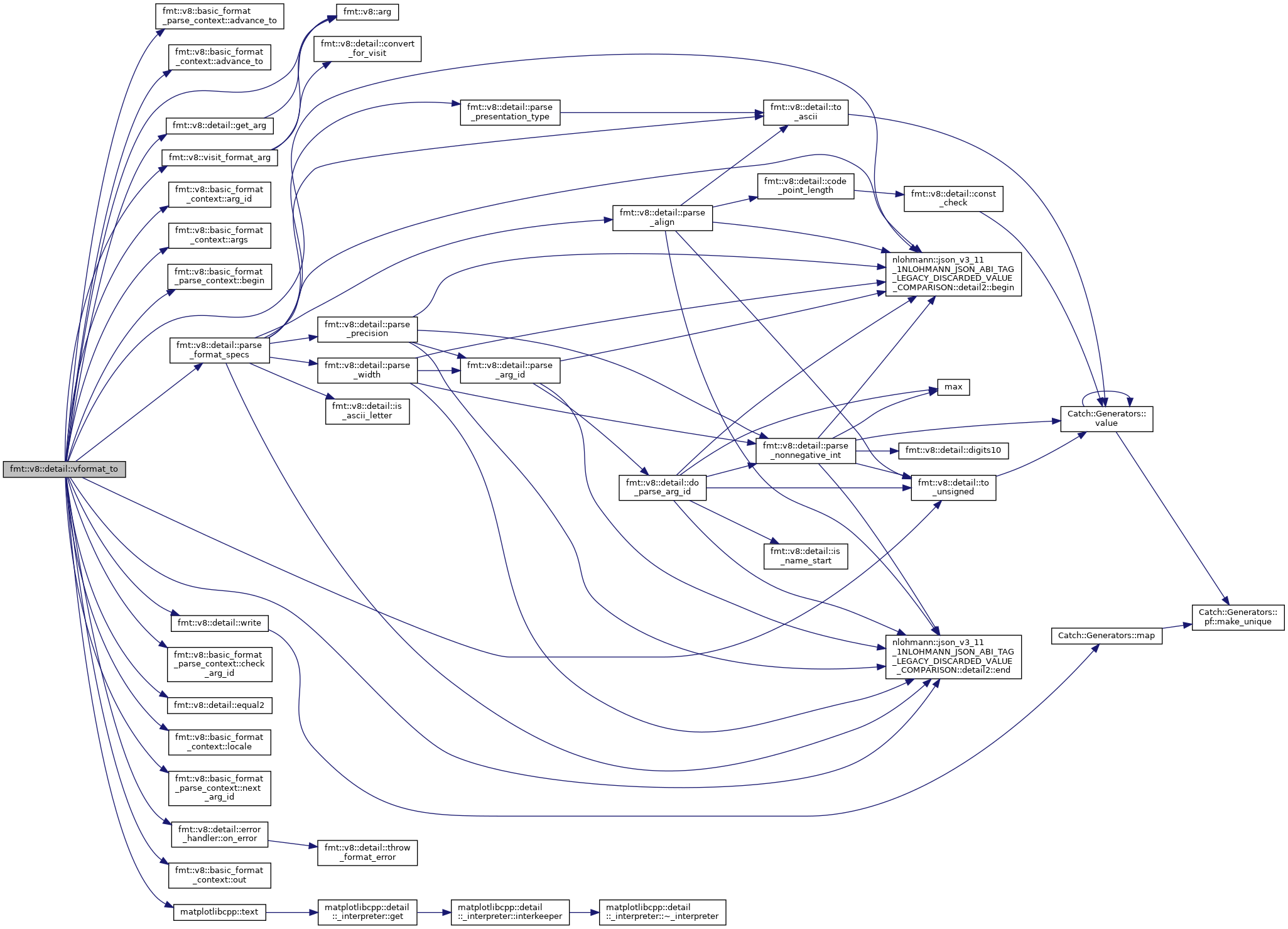
◆ vformat_to() [2/2]
template<typename Char >
| void fmt::v8::detail::vformat_to | ( | buffer< Char > & | buf, |
| const text_style & | ts, | ||
| basic_string_view< Char > | format_str, | ||
| basic_format_args< buffer_context< type_identity_t< Char >>> | args | ||
| ) |
Here is the call graph for this function:
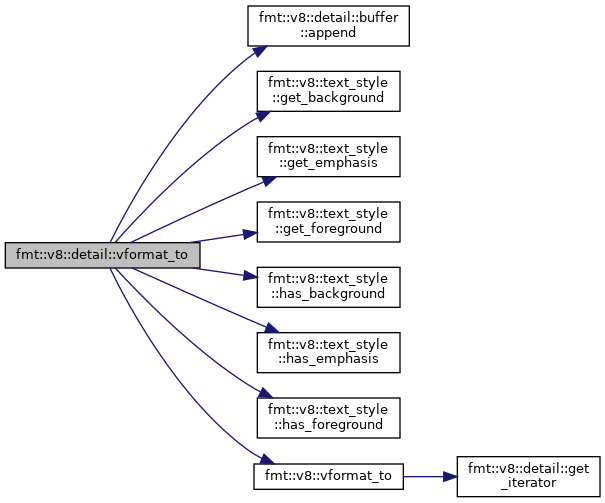
Here is the caller graph for this function:

◆ vprint_mojibake()
|
inline |
Here is the caller graph for this function:

◆ vprintf()
template<typename Char , typename Context >
| void fmt::v8::detail::vprintf | ( | buffer< Char > & | buf, |
| basic_string_view< Char > | format, | ||
| basic_format_args< Context > | args | ||
| ) |
Here is the call graph for this function:
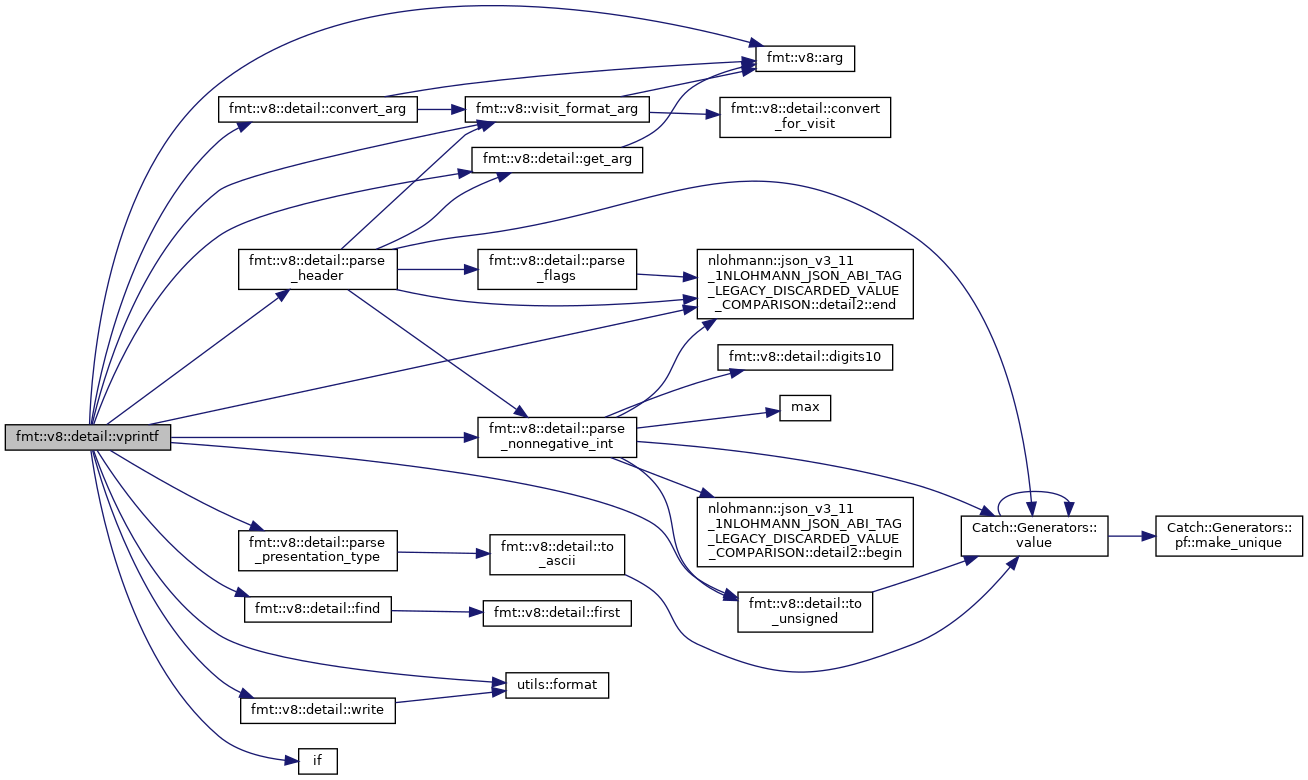
◆ write() [1/16]
template<typename Char , typename OutputIt >
| auto fmt::v8::detail::write | ( | OutputIt | out, |
| basic_string_view< Char > | s, | ||
| const basic_format_specs< Char > & | specs | ||
| ) | -> OutputIt |
Here is the call graph for this function:

◆ write() [2/16]
template<typename Char , typename OutputIt >
| auto fmt::v8::detail::write | ( | OutputIt | out, |
| basic_string_view< Char > | value | ||
| ) | -> OutputIt |
Here is the call graph for this function:

◆ write() [3/16]
template<typename Char , typename OutputIt >
| auto fmt::v8::detail::write | ( | OutputIt | out, |
| basic_string_view< type_identity_t< Char >> | s, | ||
| const basic_format_specs< Char > & | specs, | ||
| locale_ref | |||
| ) | -> OutputIt |
Here is the call graph for this function:

◆ write() [4/16]
template<typename Char , typename OutputIt >
| auto fmt::v8::detail::write | ( | OutputIt | out, |
| Char | value | ||
| ) | -> OutputIt |
Here is the call graph for this function:

◆ write() [5/16]
template<typename Char , typename OutputIt >
| auto fmt::v8::detail::write | ( | OutputIt | out, |
| Char | value, | ||
| const basic_format_specs< Char > & | specs, | ||
| locale_ref | loc = {} |
||
| ) | -> OutputIt |
◆ write() [6/16]
template<typename Char , typename OutputIt >
| auto fmt::v8::detail::write | ( | OutputIt | out, |
| const Char * | s, | ||
| const basic_format_specs< Char > & | specs, | ||
| locale_ref | |||
| ) | -> OutputIt |
Here is the call graph for this function:

◆ write() [7/16]
template<typename Char , typename OutputIt >
| auto fmt::v8::detail::write | ( | OutputIt | out, |
| const Char * | value | ||
| ) | -> OutputIt |
Here is the call graph for this function:

◆ write() [8/16]
template<typename Char , typename OutputIt , enable_if_t<(!std::is_same< Char, char >::value), int > = 0>
| auto fmt::v8::detail::write | ( | OutputIt | out, |
| const std::tm & | time, | ||
| const std::locale & | loc, | ||
| char | format, | ||
| char | modifier = 0 |
||
| ) | -> OutputIt |
Here is the call graph for this function:

Here is the caller graph for this function:
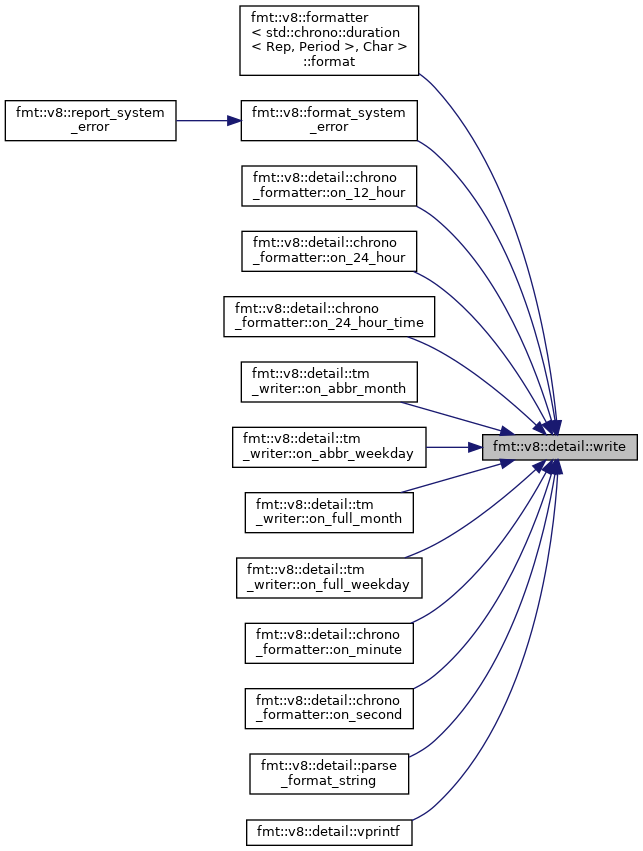
◆ write() [9/16]
template<typename Char , typename OutputIt , typename T , typename Context = basic_format_context<OutputIt, Char>>
| auto fmt::v8::detail::write | ( | OutputIt | out, |
| const T & | value | ||
| ) | -> enable_if_t< std::is_class<T>::value && !is_string<T>::value && !std::is_same<T, Char>::value && !std::is_same<const T&, decltype(arg_mapper<Context>().map(value))>::value, OutputIt> |
Here is the call graph for this function:

Here is the caller graph for this function:

◆ write() [10/16]
template<typename Char , typename OutputIt , typename T , enable_if_t<(is_string< T >::value), int > = 0>
|
constexpr |
Here is the call graph for this function:

◆ write() [11/16]
template<typename Char , typename OutputIt , typename T , enable_if_t<(std::is_same< T, void >::value), int > = 0>
| auto fmt::v8::detail::write | ( | OutputIt | out, |
| const T * | value, | ||
| const basic_format_specs< Char > & | specs = {}, |
||
| locale_ref | = {} |
||
| ) | -> OutputIt |
◆ write() [12/16]
template<typename Char , typename OutputIt >
| auto fmt::v8::detail::write | ( | OutputIt | out, |
| monostate | , | ||
| basic_format_specs< Char > | = {}, |
||
| locale_ref | = {} |
||
| ) | -> OutputIt |
◆ write() [13/16]
template<typename Char , typename OutputIt , typename T , enable_if_t<(is_fast_float< T >::value), int > = 0>
|
inline |
Here is the call graph for this function:
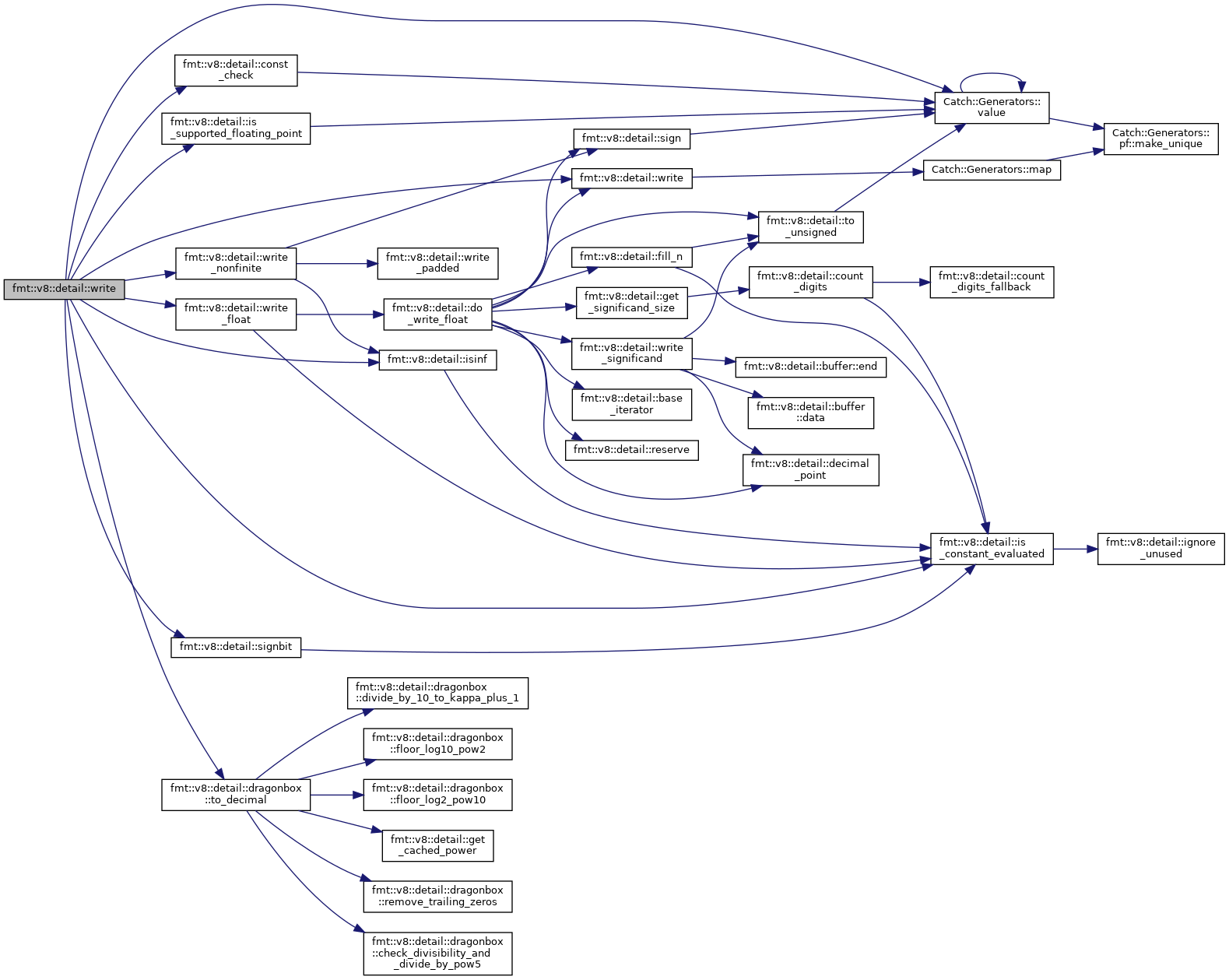
◆ write() [14/16]
template<typename Char , typename OutputIt , typename T , bool check = std::is_enum<T>::value && !std::is_same<T, Char>::value && mapped_type_constant<T, basic_format_context<OutputIt, Char>>::value != type::custom_type, enable_if_t<(check), int > = 0>
| auto fmt::v8::detail::write | ( | OutputIt | out, |
| T | value | ||
| ) | -> OutputIt |
◆ write() [15/16]
template<typename Char , typename OutputIt , typename T , enable_if_t<(std::is_floating_point< T >::value), int > = 0>
| auto fmt::v8::detail::write | ( | OutputIt | out, |
| T | value, | ||
| basic_format_specs< Char > | specs, | ||
| locale_ref | loc = {} |
||
| ) | -> OutputIt |
◆ write() [16/16]
template<typename Char , typename OutputIt , typename T , enable_if_t<(is_integral< T >::value &&!std::is_same< T, bool >::value &&std::is_same< OutputIt, buffer_appender< Char >>::value), int > = 0>
|
inline |
Here is the call graph for this function:
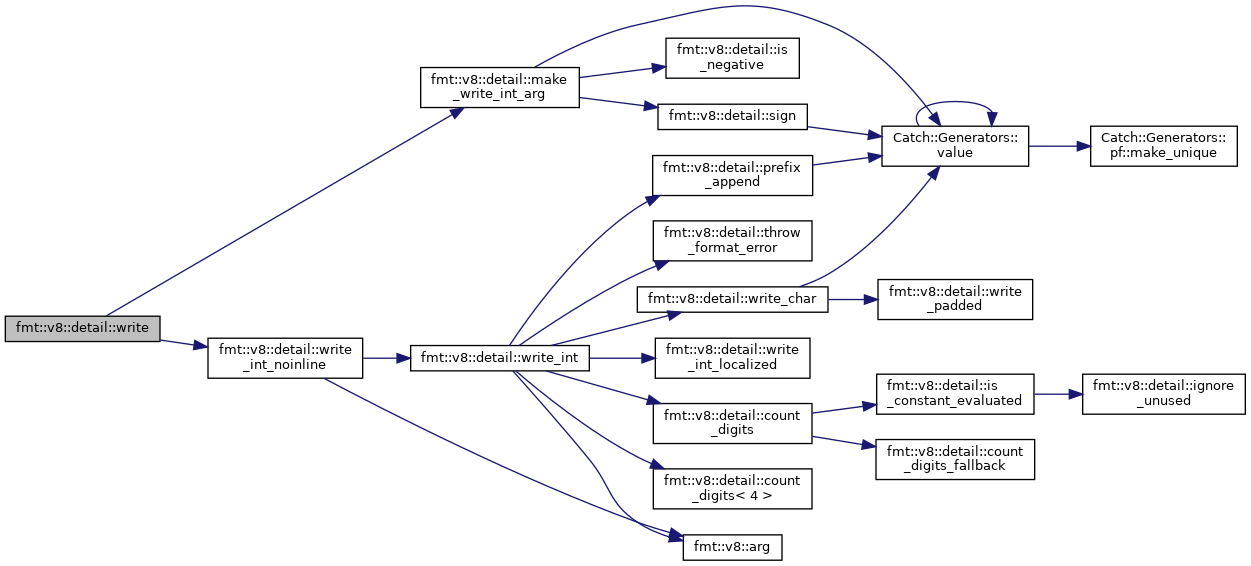
◆ write_buffer()
template<typename Char >
| void fmt::v8::detail::write_buffer | ( | std::basic_ostream< Char > & | os, |
| buffer< Char > & | buf | ||
| ) |
Here is the call graph for this function:

Here is the caller graph for this function:

◆ write_bytes()
template<align::type align = align::left, typename Char , typename OutputIt >
| auto fmt::v8::detail::write_bytes | ( | OutputIt | out, |
| string_view | bytes, | ||
| const basic_format_specs< Char > & | specs | ||
| ) | -> OutputIt |
Here is the caller graph for this function:

◆ write_char()
template<typename Char , typename OutputIt >
| auto fmt::v8::detail::write_char | ( | OutputIt | out, |
| Char | value, | ||
| const basic_format_specs< Char > & | specs | ||
| ) | -> OutputIt |
Here is the call graph for this function:

Here is the caller graph for this function:

◆ write_codecvt()
template<typename CodeUnit >
| void fmt::v8::detail::write_codecvt | ( | codecvt_result< CodeUnit > & | out, |
| string_view | in_buf, | ||
| const std::locale & | loc | ||
| ) |
Here is the call graph for this function:
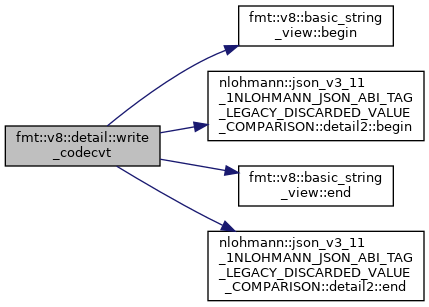
Here is the caller graph for this function:

◆ write_delimiter()
template<typename OutputIt >
| OutputIt fmt::v8::detail::write_delimiter | ( | OutputIt | out | ) |
Here is the caller graph for this function:
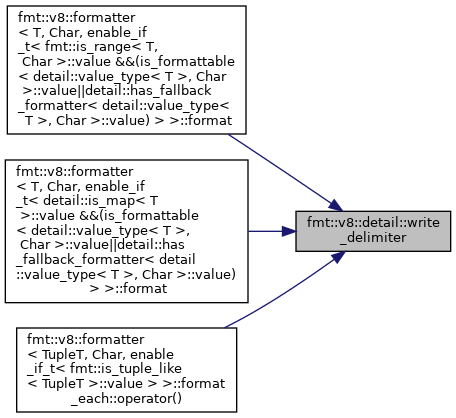
◆ write_digit2_separated()
|
inline |
Here is the call graph for this function:

Here is the caller graph for this function:
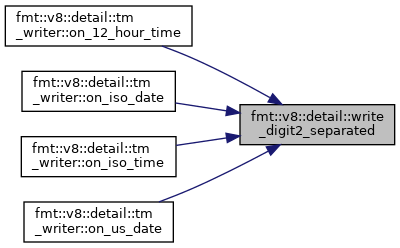
◆ write_encoded_tm_str()
template<typename OutputIt >
| auto fmt::v8::detail::write_encoded_tm_str | ( | OutputIt | out, |
| string_view | in, | ||
| const std::locale & | loc | ||
| ) | -> OutputIt |
Here is the call graph for this function:
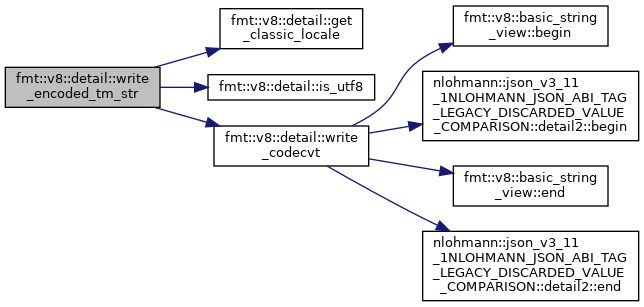
◆ write_exponent()
template<typename Char , typename It >
| auto fmt::v8::detail::write_exponent | ( | int | exp, |
| It | it | ||
| ) | -> It |
Here is the call graph for this function:

◆ write_float()
template<typename OutputIt , typename DecimalFP , typename Char >
| auto fmt::v8::detail::write_float | ( | OutputIt | out, |
| const DecimalFP & | fp, | ||
| const basic_format_specs< Char > & | specs, | ||
| float_specs | fspecs, | ||
| locale_ref | loc | ||
| ) | -> OutputIt |
Here is the call graph for this function:
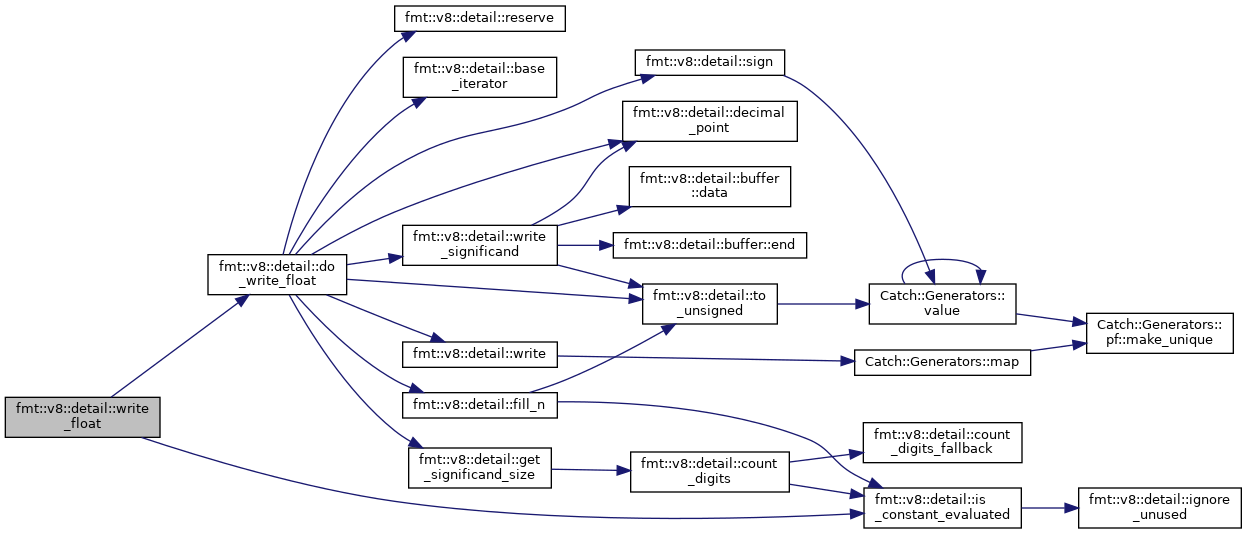
Here is the caller graph for this function:

◆ write_int() [1/2]
template<typename OutputIt , typename Char , typename W >
|
inline |
Here is the call graph for this function:

◆ write_int() [2/2]
template<typename Char , typename OutputIt , typename T >
|
inline |
Here is the call graph for this function:
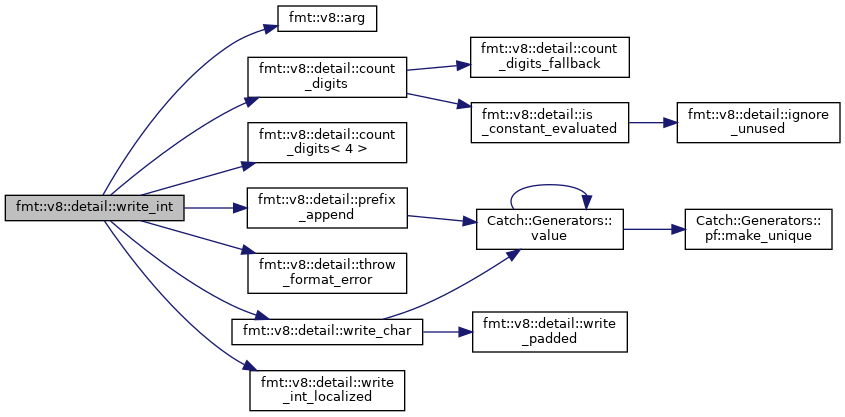
Here is the caller graph for this function:

◆ write_int_localized() [1/2]
template<typename OutputIt , typename UInt , typename Char >
| auto fmt::v8::detail::write_int_localized | ( | OutputIt & | out, |
| UInt | value, | ||
| unsigned | prefix, | ||
| const basic_format_specs< Char > & | specs, | ||
| locale_ref | loc | ||
| ) | -> bool |
Here is the caller graph for this function:

◆ write_int_localized() [2/2]
template<typename OutputIt , typename UInt , typename Char >
| auto fmt::v8::detail::write_int_localized | ( | OutputIt | out, |
| UInt | value, | ||
| unsigned | prefix, | ||
| const basic_format_specs< Char > & | specs, | ||
| const digit_grouping< Char > & | grouping | ||
| ) | -> OutputIt |
Here is the call graph for this function:

◆ write_int_noinline()
template<typename Char , typename OutputIt , typename T >
| auto fmt::v8::detail::write_int_noinline | ( | OutputIt | out, |
| write_int_arg< T > | arg, | ||
| const basic_format_specs< Char > & | specs, | ||
| locale_ref | loc | ||
| ) | -> OutputIt |
Here is the call graph for this function:
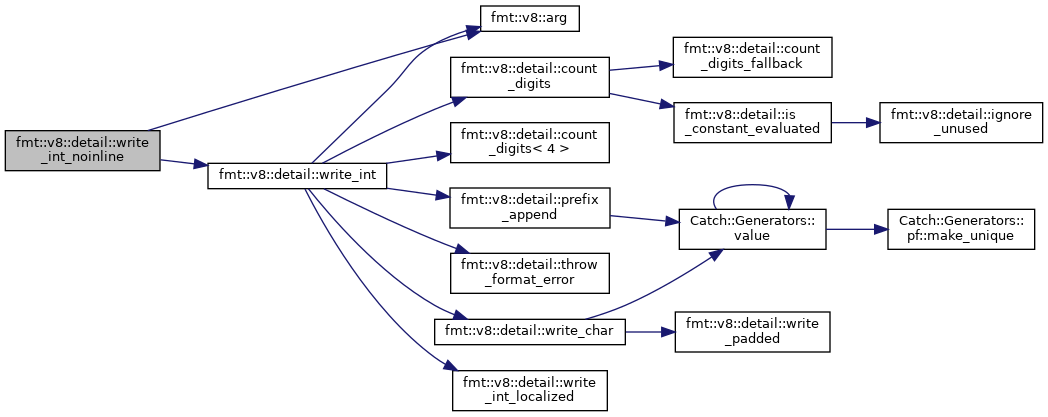
Here is the caller graph for this function:

◆ write_nonfinite()
template<typename Char , typename OutputIt >
| auto fmt::v8::detail::write_nonfinite | ( | OutputIt | out, |
| bool | isinf, | ||
| basic_format_specs< Char > | specs, | ||
| const float_specs & | fspecs | ||
| ) | -> OutputIt |
Here is the call graph for this function:

Here is the caller graph for this function:

◆ write_padded() [1/2]
template<align::type align = align::left, typename OutputIt , typename Char , typename F >
|
constexpr |
Here is the caller graph for this function:

◆ write_padded() [2/2]
template<align::type align = align::left, typename OutputIt , typename Char , typename F >
| auto fmt::v8::detail::write_padded | ( | OutputIt | out, |
| const basic_format_specs< Char > & | specs, | ||
| size_t | size, | ||
| size_t | width, | ||
| F && | f | ||
| ) | -> OutputIt |
Here is the call graph for this function:

◆ write_ptr()
template<typename Char , typename OutputIt , typename UIntPtr >
| auto fmt::v8::detail::write_ptr | ( | OutputIt | out, |
| UIntPtr | value, | ||
| const basic_format_specs< Char > * | specs | ||
| ) | -> OutputIt |
Here is the call graph for this function:
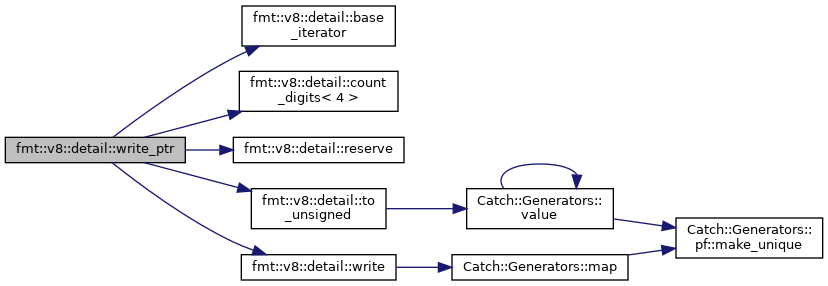
◆ write_range_entry() [1/4]
template<typename Char , typename OutputIt >
| auto fmt::v8::detail::write_range_entry | ( | OutputIt | out, |
| basic_string_view< Char > | str | ||
| ) | -> OutputIt |
Here is the call graph for this function:

◆ write_range_entry() [2/4]
template<typename Char , typename OutputIt , typename Arg , enable_if_t<(!is_std_string_like< typename std::decay< Arg >::type >::value &&!std::is_same< Arg, Char >::value), int > = 0>
| OutputIt fmt::v8::detail::write_range_entry | ( | OutputIt | out, |
| const Arg & | v | ||
| ) |
◆ write_range_entry() [3/4]
template<typename Char , typename OutputIt , typename Arg , enable_if_t<(std::is_same< Arg, Char >::value), int > = 0>
| OutputIt fmt::v8::detail::write_range_entry | ( | OutputIt | out, |
| const Arg | v | ||
| ) |
◆ write_range_entry() [4/4]
template<typename Char , typename OutputIt , typename T , enable_if_t<(std::is_convertible< T, std_string_view< char >>::value), int > = 0>
|
inline |
◆ write_significand() [1/7]
template<typename Char , typename UInt , enable_if_t<(std::is_integral< UInt >::value), int > = 0>
|
inline |
Here is the call graph for this function:

◆ write_significand() [2/7]
template<typename Char , typename OutputIt >
|
constexpr |
◆ write_significand() [3/7]
template<typename OutputIt , typename Char >
| auto fmt::v8::detail::write_significand | ( | OutputIt | out, |
| const char * | significand, | ||
| int | significand_size, | ||
| int | integral_size, | ||
| Char | decimal_point | ||
| ) | -> OutputIt |
Here is the call graph for this function:

◆ write_significand() [4/7]
template<typename Char , typename OutputIt , typename T , typename Grouping >
| auto fmt::v8::detail::write_significand | ( | OutputIt | out, |
| T | significand, | ||
| int | significand_size, | ||
| int | exponent, | ||
| const Grouping & | grouping | ||
| ) | -> OutputIt |
Here is the call graph for this function:

◆ write_significand() [5/7]
template<typename OutputIt , typename Char , typename T , typename Grouping >
| auto fmt::v8::detail::write_significand | ( | OutputIt | out, |
| T | significand, | ||
| int | significand_size, | ||
| int | integral_size, | ||
| Char | decimal_point, | ||
| const Grouping & | grouping | ||
| ) | -> OutputIt |
Here is the call graph for this function:

Here is the caller graph for this function:

◆ write_significand() [6/7]
template<typename Char , typename OutputIt , typename UInt >
|
inline |
◆ write_significand() [7/7]
template<typename OutputIt , typename UInt , typename Char , enable_if_t<(!std::is_pointer< remove_cvref_t< OutputIt >>::value), int > = 0>
|
inline |
Here is the call graph for this function:

◆ write_tm_str()
template<typename Char , typename OutputIt , enable_if_t<(!std::is_same< Char, char >::value), int > = 0>
| auto fmt::v8::detail::write_tm_str | ( | OutputIt | out, |
| string_view | sv, | ||
| const std::locale & | loc | ||
| ) | -> OutputIt |
Here is the call graph for this function:

Variable Documentation
◆ invalid_arg_index
|
constexpr |
◆ invalid_code_point
|
constexpr |
◆ log10_2_significand
|
staticconstexpr |
◆ micro
|
constexpr |
